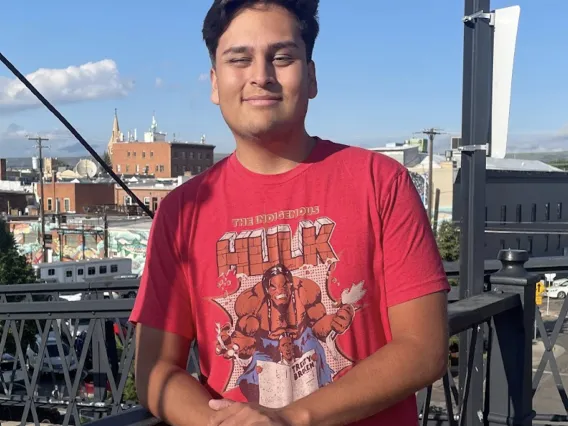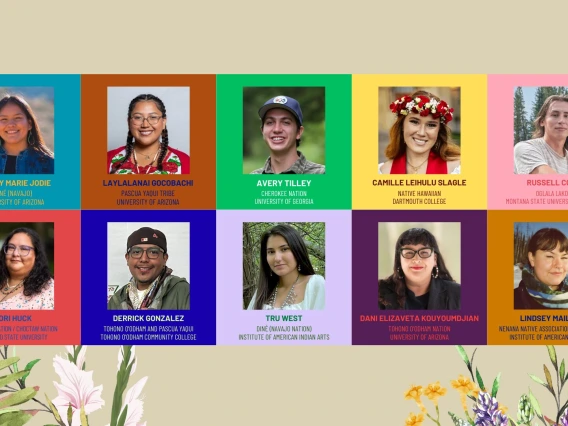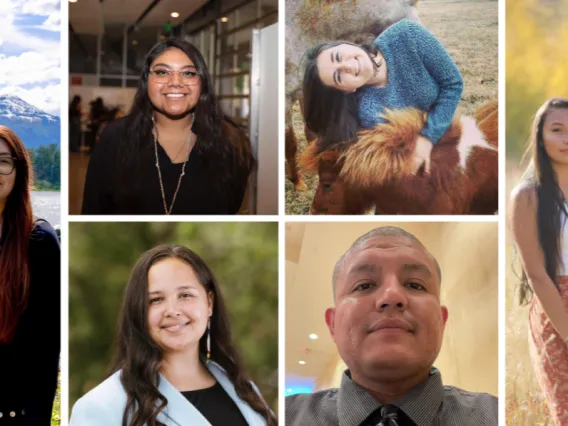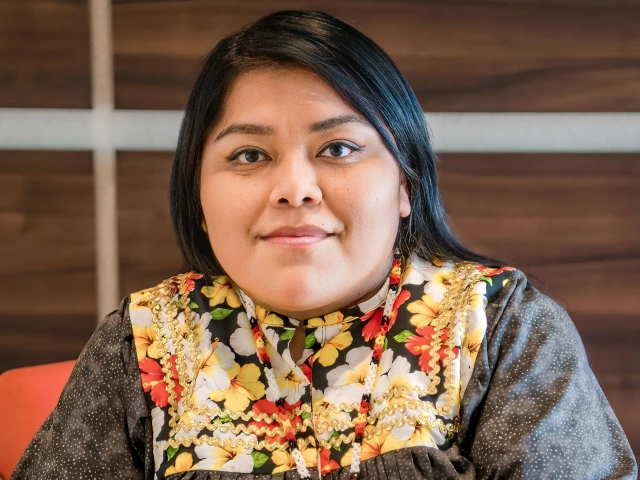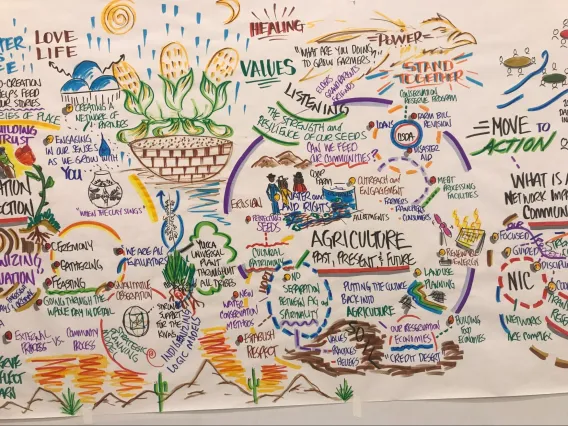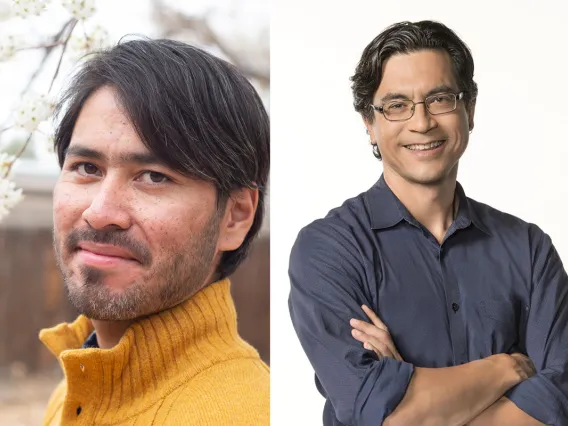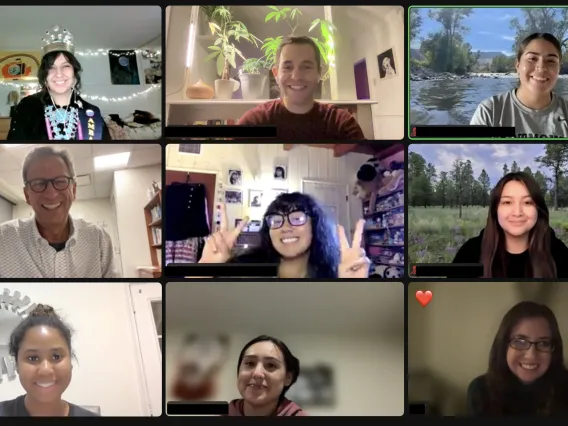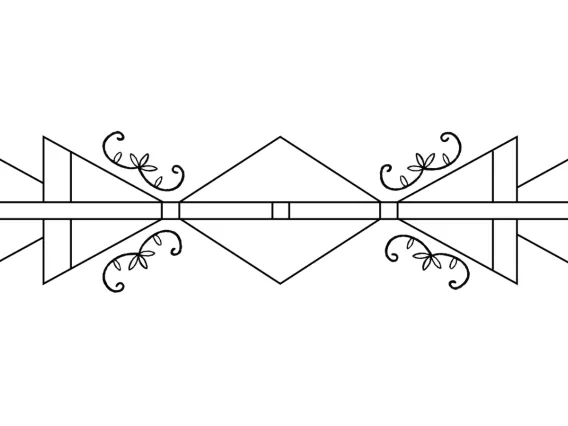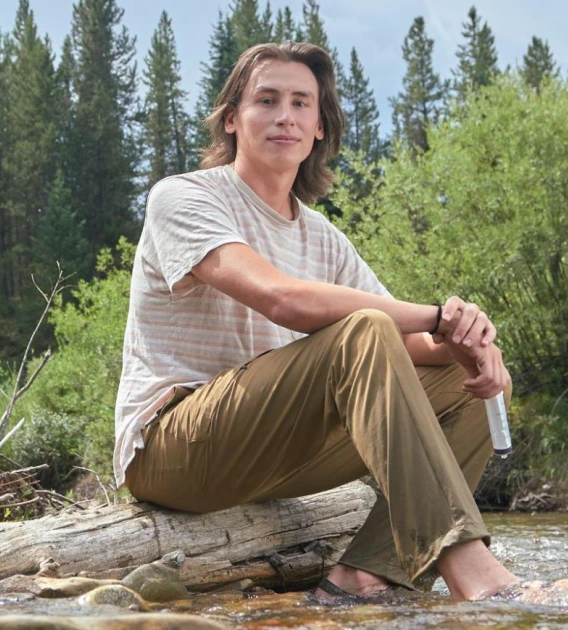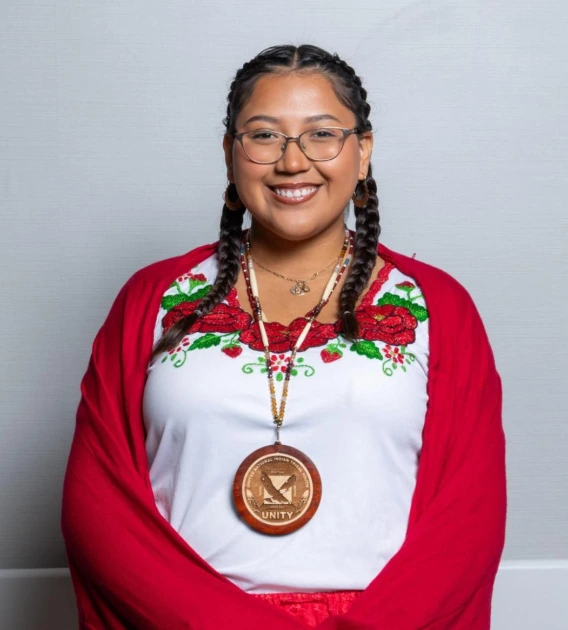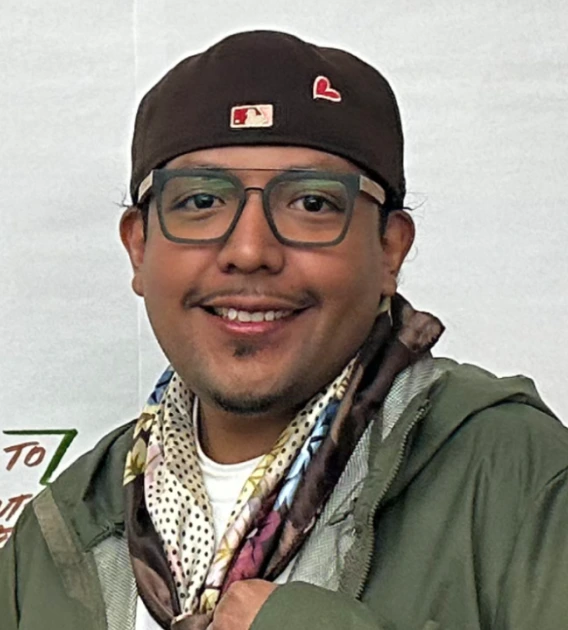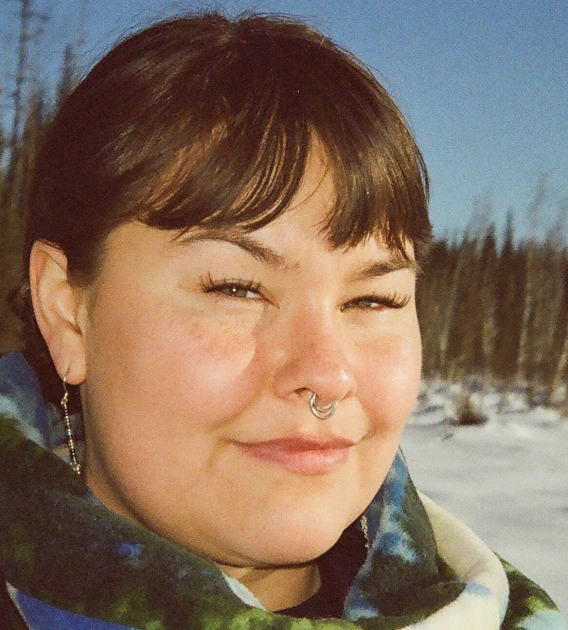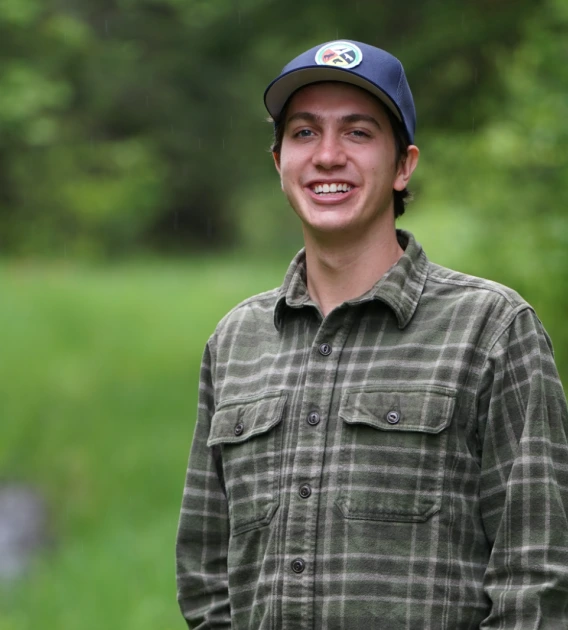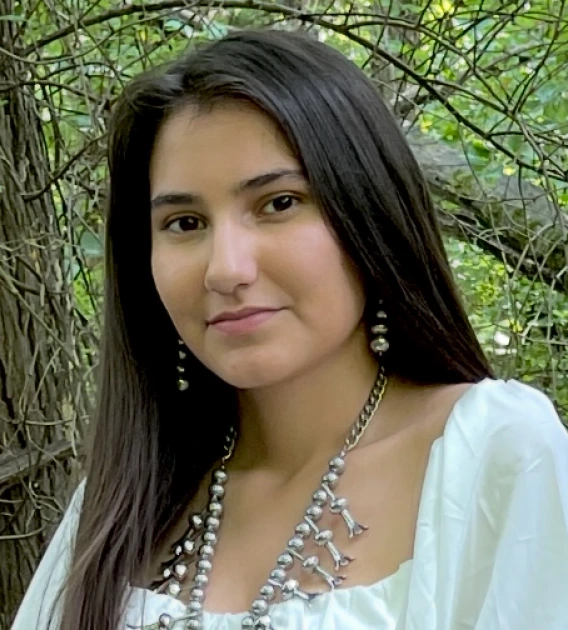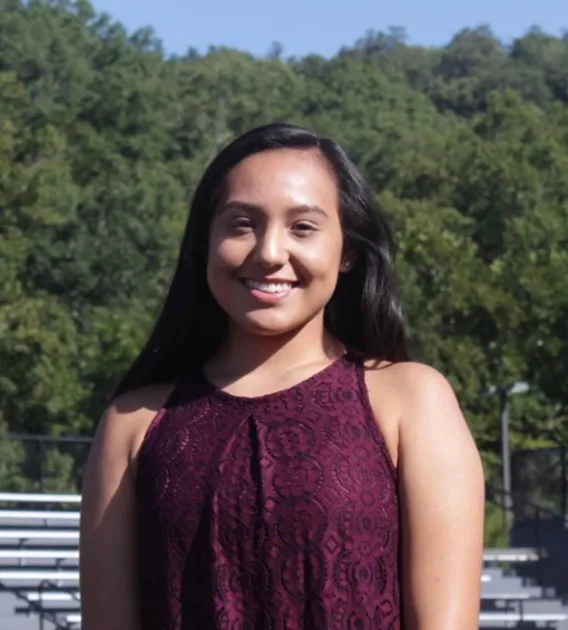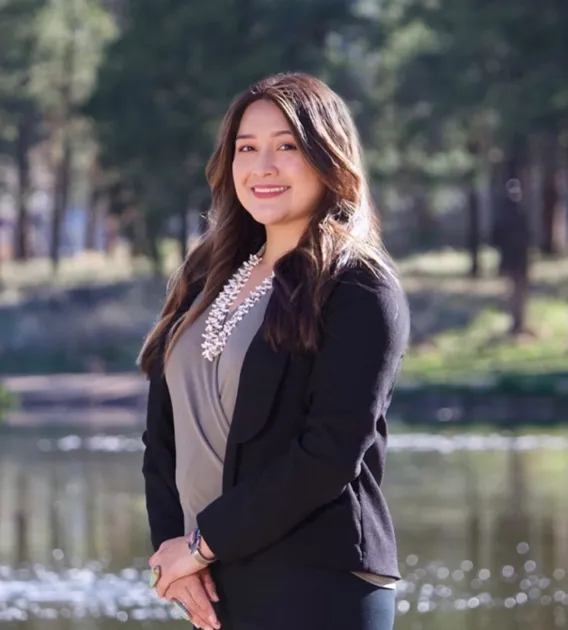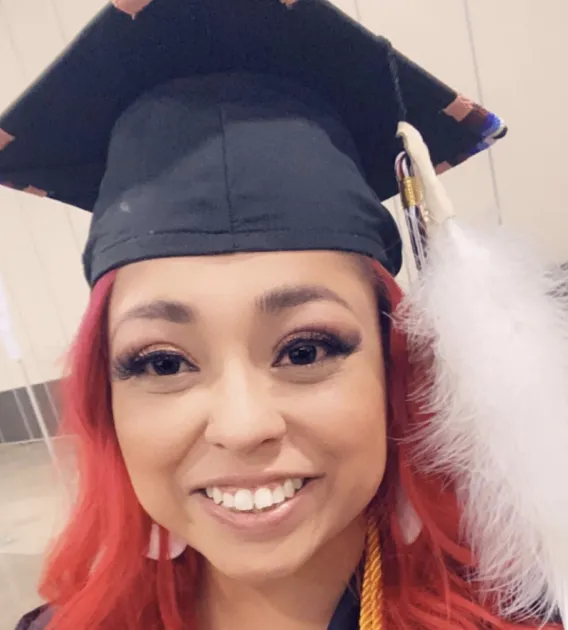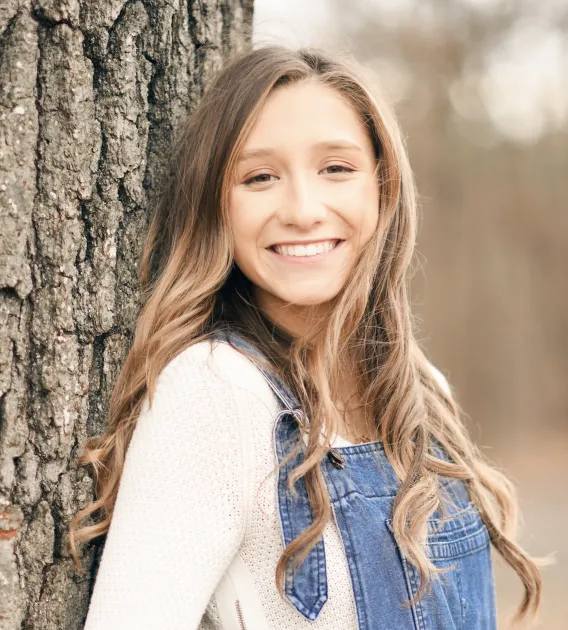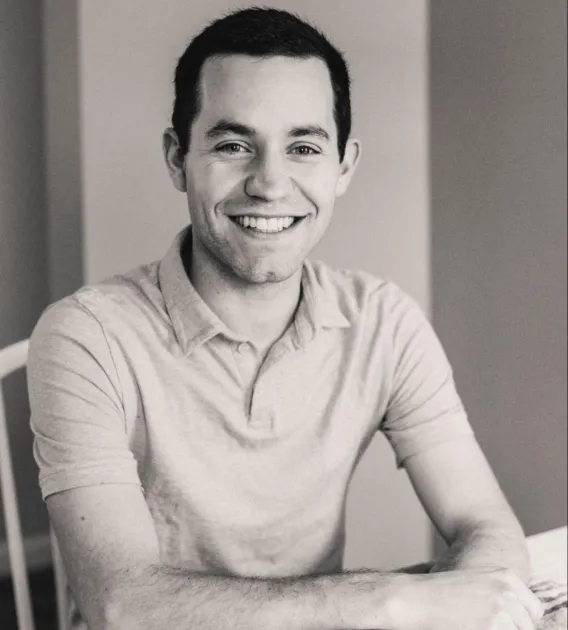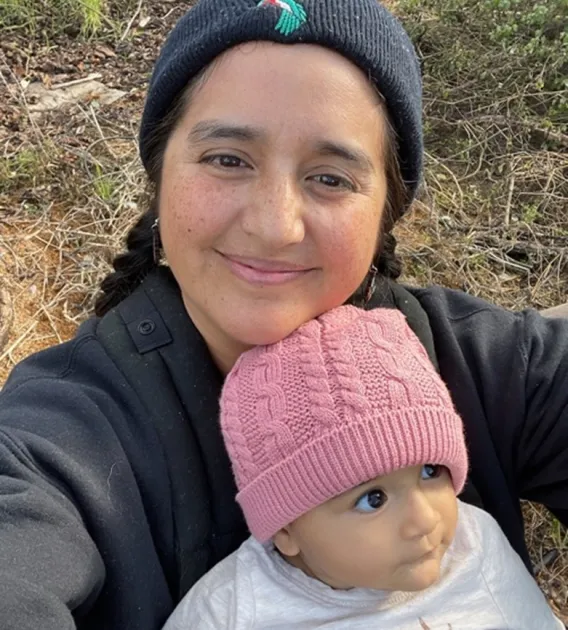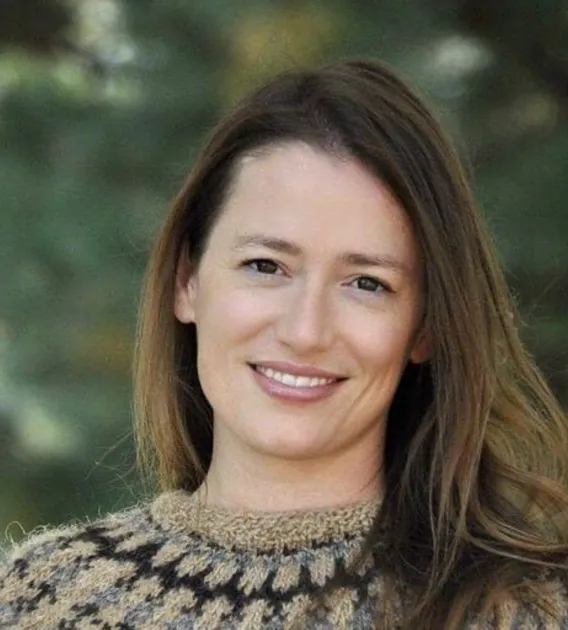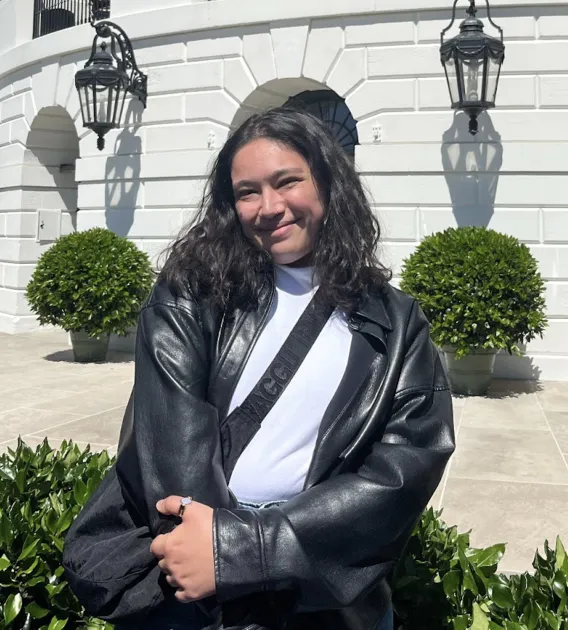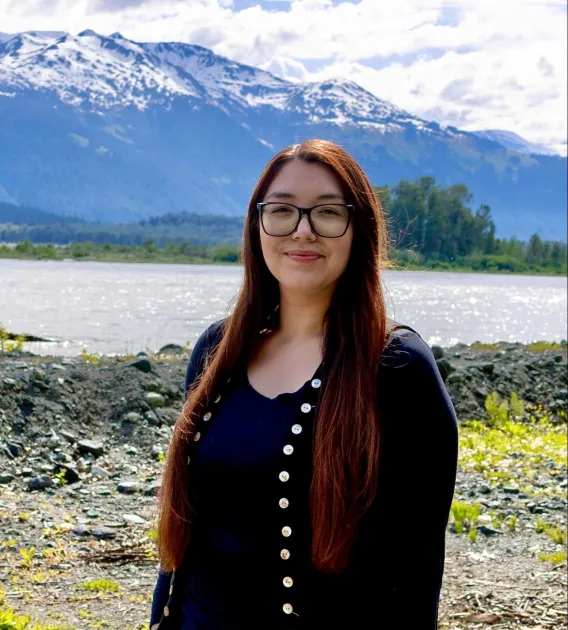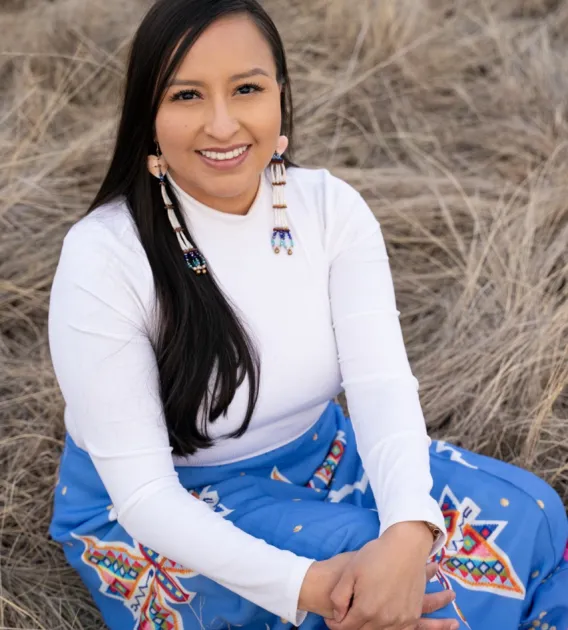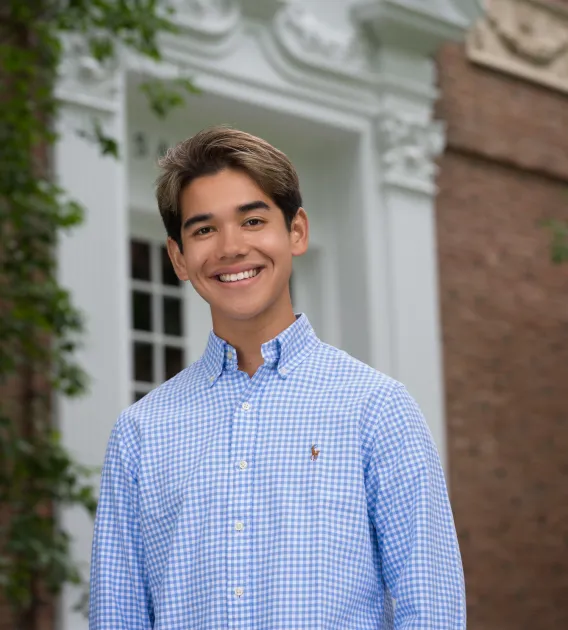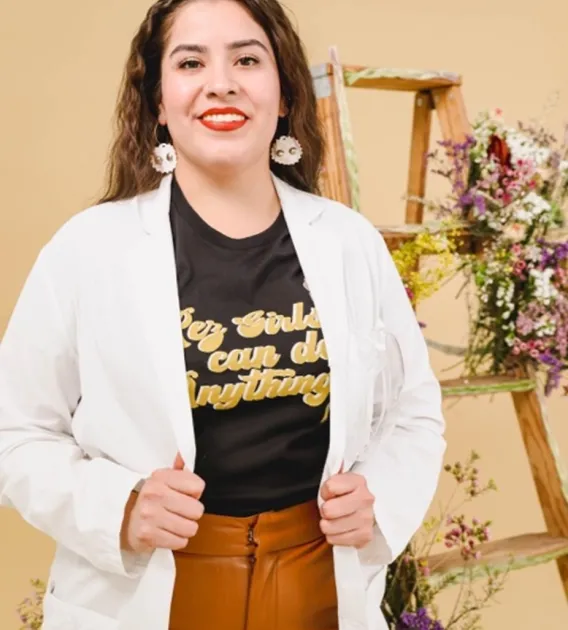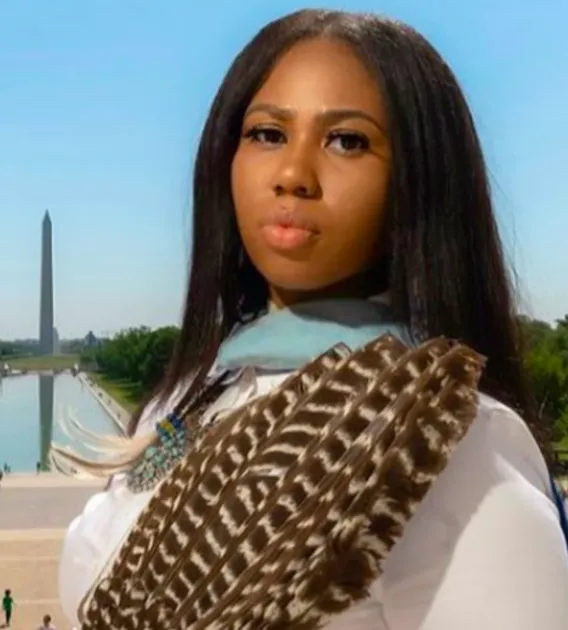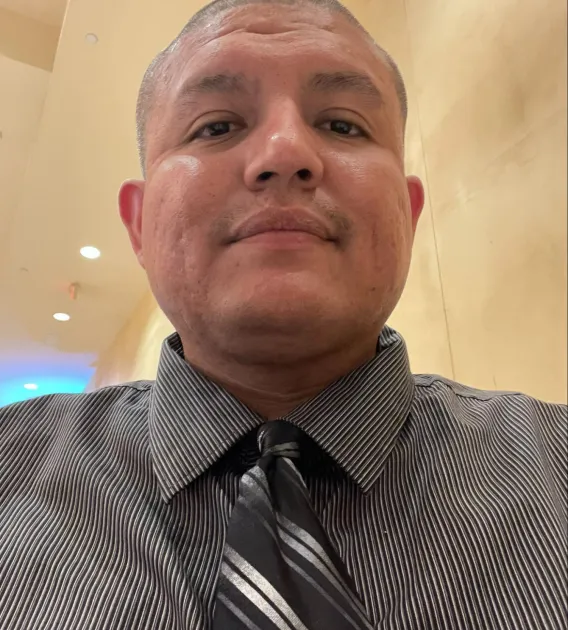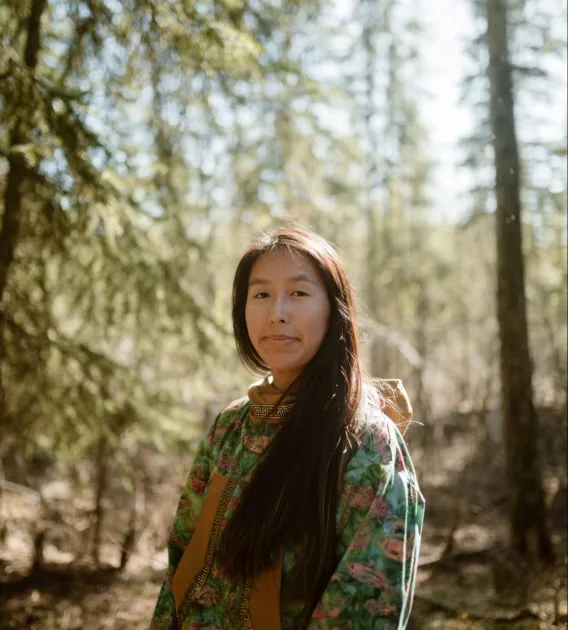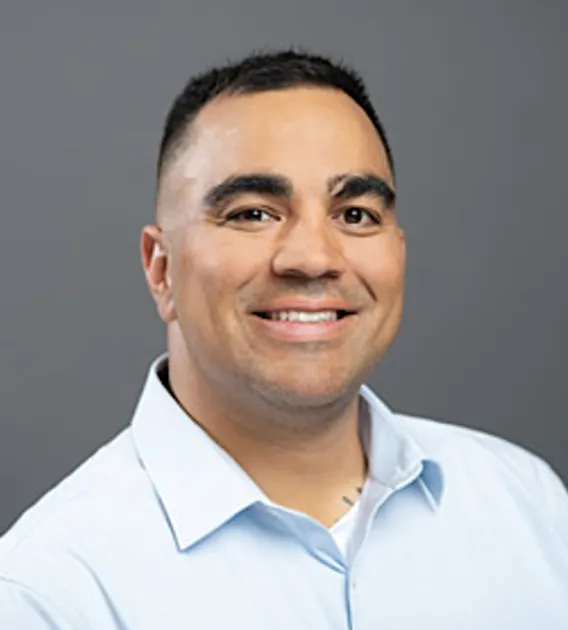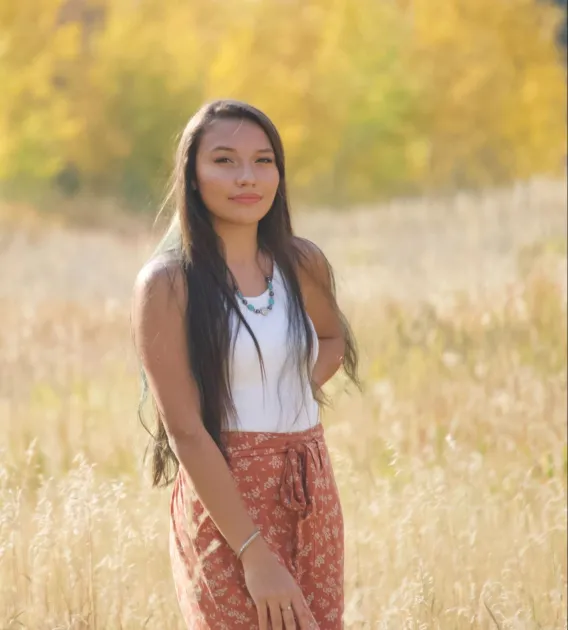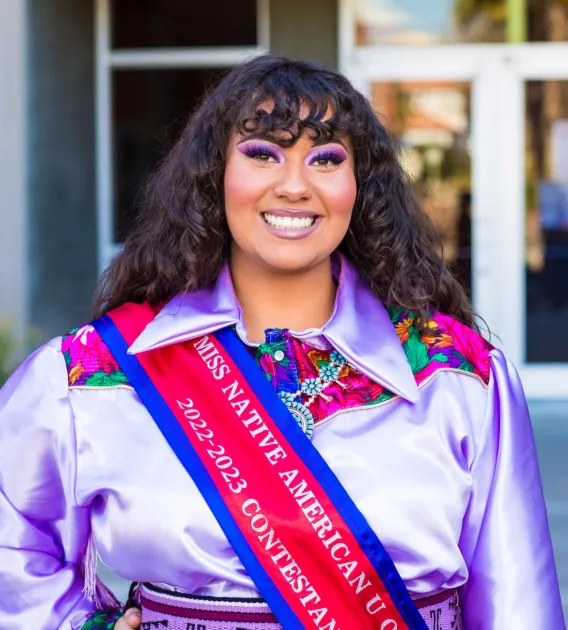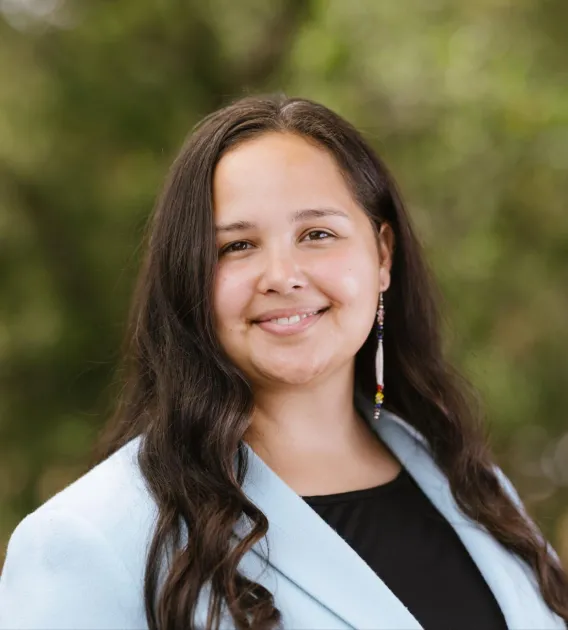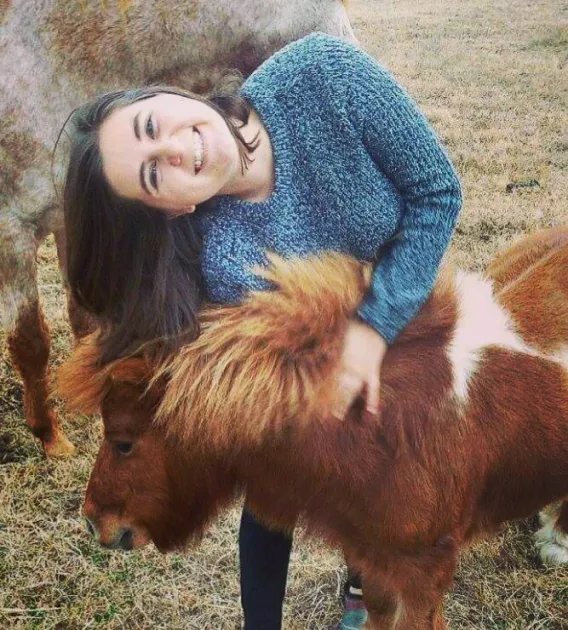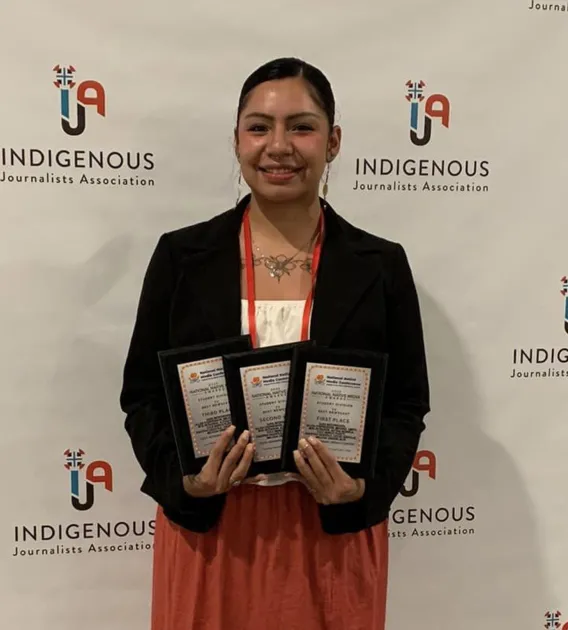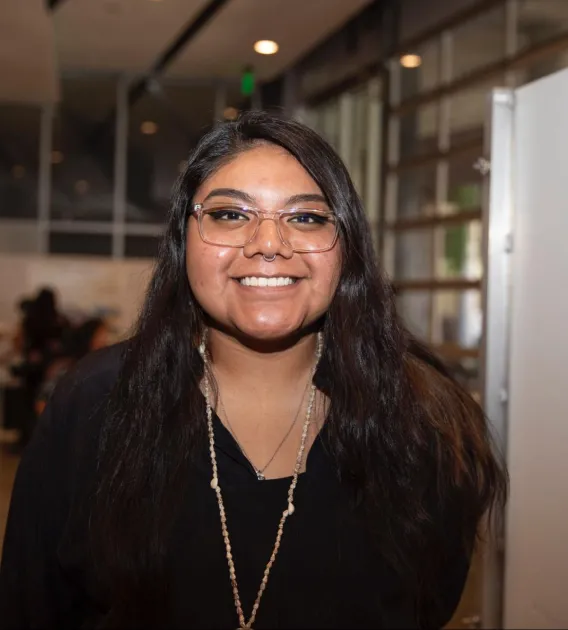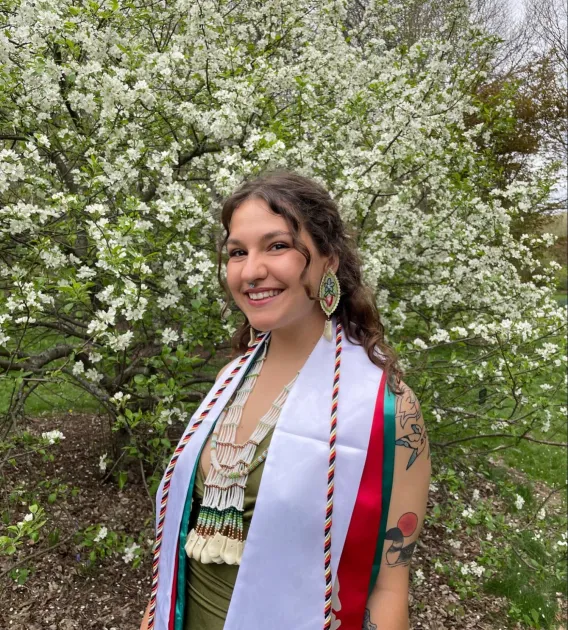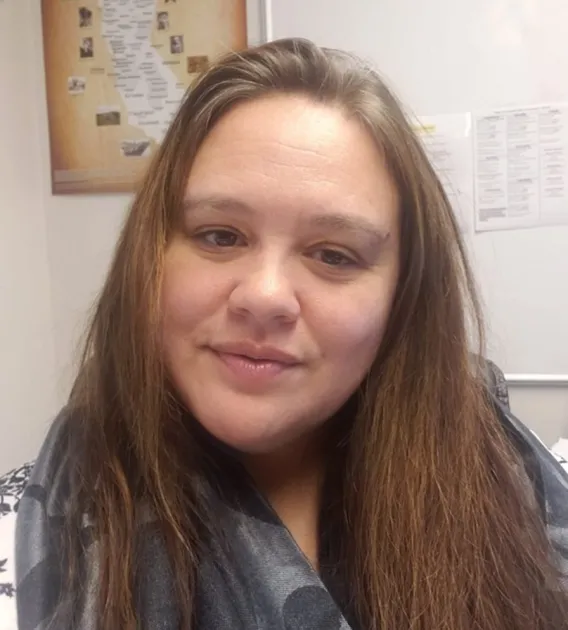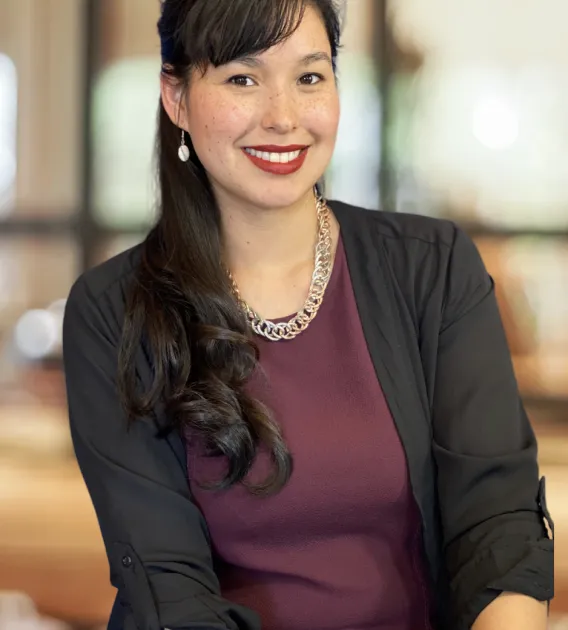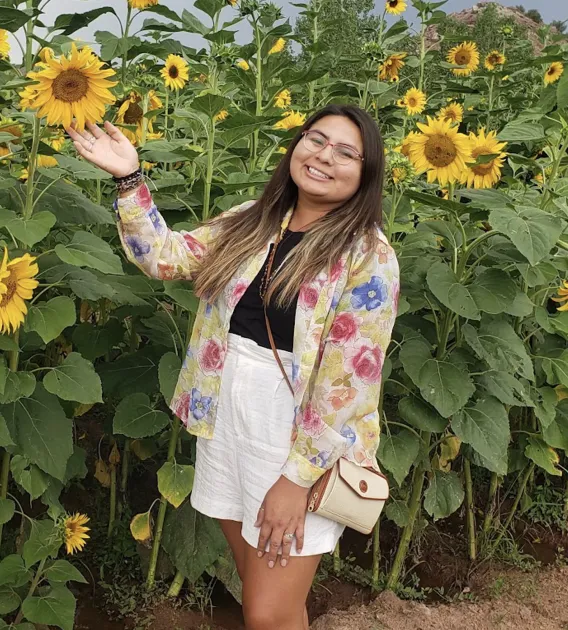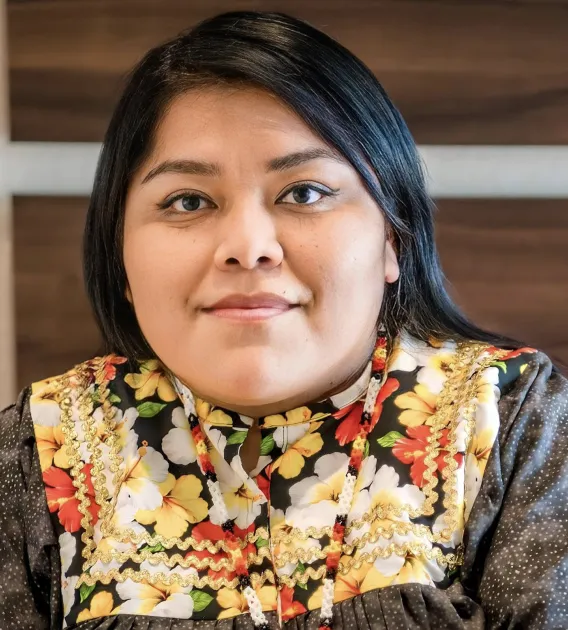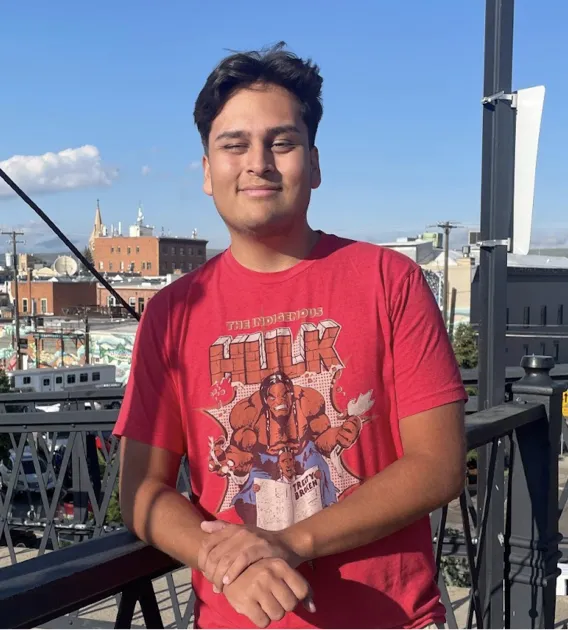Ilíiaitchik:
Indigenous Correspondents Program
Planet Forward and UArizona have partnered to launch the Ilíiaitchik: Indigenous Correspondents Program (ICP). The goal of the ICP is to empower the next generation of Indigenous scholars to share environmental stories and resilient solutions of relevance around the world.
Photo Credit: JarRette Werk
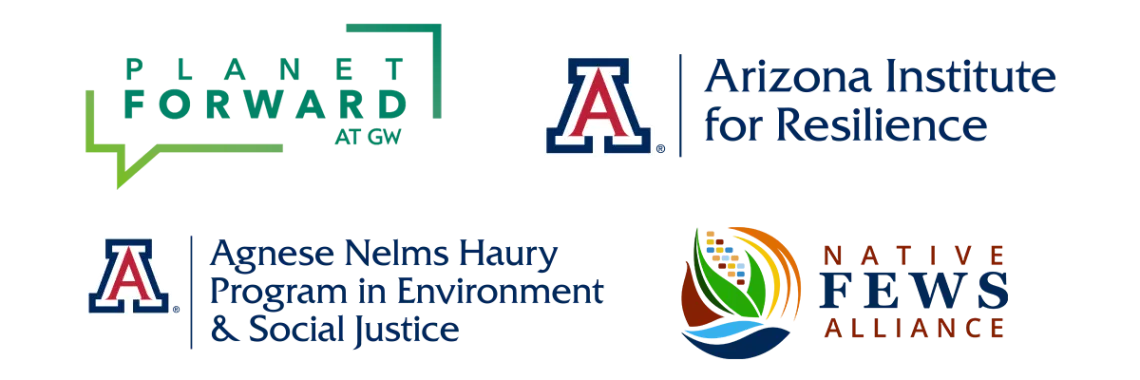

Planet Forward, an environmental storytelling initiative of the George Washington University School of Media and Public Affairs, collaborates with the University of Arizona’s AIR Education Initiatives and the Indigenous Resilience Center (IRes) as well as the Native FEWS Alliance to support greater participation by Indigenous students in a program that centers their voices and brings broader perspectives to the successful Planet Forward platform.
The Ilíiaitchik: Indigenous Correspondents Program (ICP) supports 10 Indigenous students through a year-long professional development, communication skill-building, and community-building program led by Indigenous mentors in fields ranging from environmental journalism and science, to photography and music production. Students with an interest in environmental science-related fields, finding and sharing resilient, innovative solutions, and effective storytelling in media spaces are encouraged to apply when applications are available. Applications for 2025-2026 are now closed. Check back soon to see who our new correspondents are for this year!
The program’s name - Ilíiaitchik (Phonetic spelling: "Ih-lia-it-chick") means "to speak good words" in Biiluuke/Our Side/Crow. The program’s co-founder, JoRee LaFrance, comes from the Apsáalooke/Crow Nation and selected a word from her language that encompasses the program’s goal to amplify voices bringing about positive change. The ICP is supported by a team of faculty and staff at the University of Arizona and Planet Forward, including an Indigenous Editor/Story Mentor, Ivey Camille Manybeads Tso (Diné), and two Program Managers, Alexander Cotnoir (Alnôbak) and JoRee LaFrance (Apsáalooke).
Read our 2022-23 Annual Report
2023-2024 Annual Report Coming Soon
Our mission is to support greater participation by Indigenous students in multimedia environmental communication spaces.
Reporting about science and the environment has not always been inclusive nor respectful of Indigenous communities and knowledge systems. Although Indigenous people are disproportionately impacted by climate change and global biodiversity loss, only a very small percentage of scientists, professors, journalists and news organizations are Indigenous. Additionally, despite modest increases in Indigenous representation among STEM professionals in recent years, recent research from the Institute for Scientific Information shows that between 2010 and 2020, there “was virtually no change in the representation of Black, Hispanic, and Native American researchers among authors of scientific publications” a symptom of structural inequality and systemic oppression, including underfunding of BIPOC academics. This lack of resources and representation influences the coverage and perspective around issues of environmental justice, climate adaptation, and environmental policy. A lack of Indigenous perspectives and voices in media and communication spaces contributes to a myriad of problems, including: the perpetuation of harmful stereotypes and inaccuracies about Indigenous people, knowledge systems, and current issues, erasure of Indigenous languages and ways of knowing, and actions that disproportionately harm and/or neglect Native communities.
Meet The Correspondents
Get to know current and former Indigenous Correspondents.
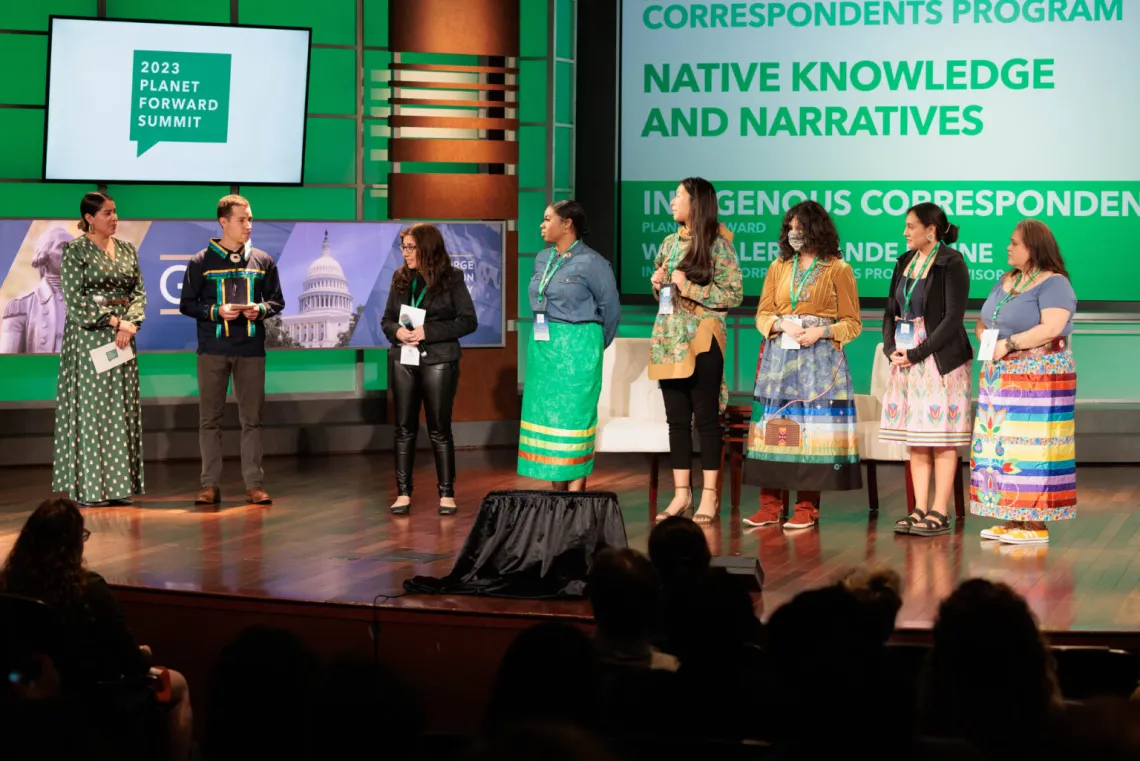
Photo Credit: GW Planet Forward
The Indigenous Correspondents Program works to create a more equitable space for Indigenous voices and perspectives to be heard - on their terms - amid this truly global effort. The long-term goals of the Indigenous Correspondents Program are to increase participation in Earth and environmental science communication and related fields among Indigenous students and to increase the quality and quantity of Indigenous stories in media across the US.
Indigenous Correspondents Program participants periodically meet with fellow cohort members (~10 students), Indigenous activists, journalists, storytellers (i.e. journalists, musicians, photographers, etc.), and scientists to advance their storytelling and communication skills while building their professional and community networks. Participants also receive one-on-one mentorship and guidance in creating and publishing a final environmental communication piece (e.g., essay/article, multimedia story, podcast, short video, etc.) through meeting one-on-one with an Indigenous Editor/Story Mentor and/or peer review sessions. Participants will receive a Certificate of Completion for their involvement in the program and a $1,000 stipend for their participation. Throughout the ICP, participants’ experiences center around four main goals, including:
- Personal growth: Reclaiming/gaining confidence in your narrative and voice, telling personal stories, healing through creative expression, and connecting with the land and our communities through storytelling
- Skill building: Learn effective science communication strategies and storytelling techniques, including multimedia software skills, interviewing, creating, editing, publishing and pitching story content
- Networking/community building: Accomplished through one-on-one discussions, meetings, and guidance from/with Indigenous speakers and ICP’s Indigenous Editor/ Story Mentor, monthly virtual social gatherings with fellow cohort members, access to the Native American Journalists Association, Indian Country Today, National Museum of Natural History, National Museum of the American Indian, National Geographic, and other platforms and experts as applicable
- Publishing: Participants work on a storytelling piece to be published on Planet Forward’s platform, which will also be shared through UArizona and George Washington University’s networks. The final story can take various forms, either as a short written article, a podcast, music piece, photo essay, exhibition, multimedia story, podcast, or written piece, etc. showcasing the participants’ communication skills highlighting an environmental issue and/or solution of their choice
Program Timeline
- Monthly workshops: Participants will engage in eight monthly workshops (each two-hours long) over the course of the 10-month program. These workshops will be led primarily by Indigenous experts working in diverse fields. Workshops will occur in the following sequence: 1) Healing Through Storytelling, 2) The Art of the Interview, 3) Producing a Publication-ready Piece and Pitching, 4) Multimedia Communication, 5) Indigenous Knowledge in Science Communication, and 6) Using Software and Technology to Enhance Storytelling, 7) Journalism in Indian Country, and 8) Sharing Your Story: Designing a Personal Web Page.
- Planet Forward Summit: The Indigenous Correspondents Program will culminate with participants traveling to Washington, D.C. to attend the Planet Forward Summit occurring every April, which brings together scientists, students, and storytellers from around the U.S. and the world to discuss issues of effective environmental communication. Over the course of four days, correspondents will connect with and learn from leading journalists, policymakers, and innovators across disciplines, both at the Summit and across Washington, DC. (For example, in 2024, ICP participants met with scientists at the Smithsonian Conservation Biology Institute, reporters at National Public Radio, and Indigenous policymakers at the Department of Interior and the Bureau of Indian Affairs). *Note: Participants’ travel and lodging expenses will be covered to ensure everyone can attend the summit trip if they choose to do so.
- Mentoring check-ins & peer-review: In addition to providing participants with ample opportunities to hone their storytelling skills through workshops, Indigenous Correspondents meet periodically with ICP’s Indigenous Editor and members of their cohort for peer-review sessions. Meeting dates will be determined according to participants’ availability and schedule. Check-ins are for students to discuss their current thoughts and progress on your story, resolve any hurdles in their storytelling process, and to receive editorial feedback. Peer-review sessions are scheduled, organized, and moderated by ICP's coordinators as opportunities for the Correspondents to receive tailored feedback throughout their drafting process.
- Community-building events: To help create a sense of community, participants will also be invited to take part in virtual community-building events, such as team-building and story-sharing nights. These events will be announced in advance by the Planet Forward ICP Coordinators.
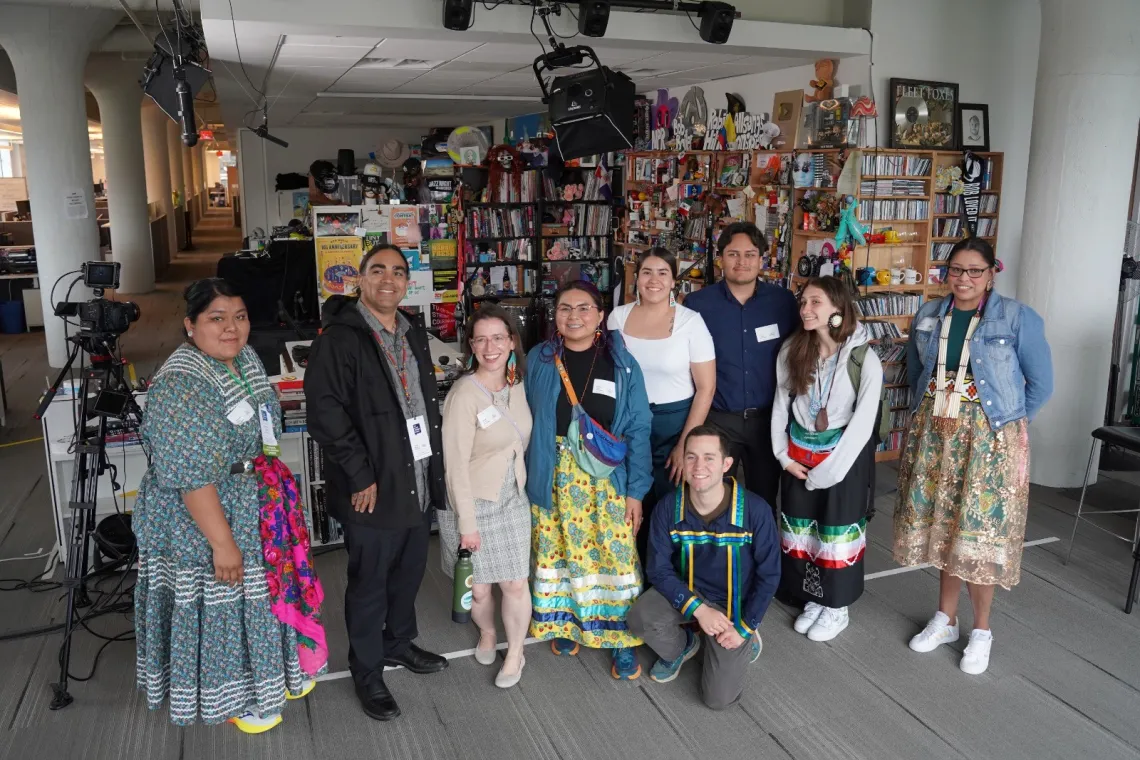
Photo Credit: Denisse Ortega-Lorona
Over the course of the Ilíiaitchik program, Indigenous Correspondents attend a series of eight monthly workshops led by Indigenous mentors. Workshop leaders represent a variety of communication fields, ranging from photojournalism and filmmaking to education and scientific research. These workshops provide Indigenous Correspondents with unique opportunities to ask questions of experts in the field, engage in dialogue about stories, learn new storytelling techniques and practices, and receive feedback on their work. Below is a synopsis of the past Ilíiaitchik Indigenous Correspondents Program workshops, including a list of workshop leaders and learning objectives for each workshop:
Workshop leader:
- 2022-25: Cinnamon Spear
- Cinnamon Spear is a Northern Cheyenne artist, documentary filmmaker, speaker, educator, and author of Maria Tallchief: Woman of Two Worlds, Go Dance!, and a forthcoming book. Cinnamon owns and operates Northside Advocacy LLC and is currently working on several projects aimed at supporting Indigenous youth and mental/emotional wellbeing.
Learning goals/ objectives:
- Introduce meditation and mindful reading techniques to process academic stressors
- Learn how writing can be used as a tool to help heal ourselves and our communities
- Offer tips for self-care, self-love, and for building confidence in your storytelling voice
- Reclaiming narratives (focusing on body and heart in academia)
- Practice writing “six word stories” to convey and process emotions and our own stories
Workshop leaders:
- 2022-23: Duncan McCue & Kalen Good Luck
- Duncan McCue is an award-winning Anishinaabe television and radio journalist for the Canadian Broadcasting Corporation. McCue’s Decolonizing Journalism: A Guide to Reporting in Indigenous Communities is the only text in Canada that teaches aspiring journalists how to build respectful, reciprocal relationships with Indigenous communities when researching and sharing their stories.
- Kalen Goodluck is a Diné, Mandan, Hidatsa and Tsimshian journalist and photographer currently based in Albuquerque, New Mexico. His reporting has been in The New York Times, High Country News, Pulitzer Center, National Geographic - Travel, Mother Jones, WIRED, NBC News, KCET, Off Assignment, Bklyner, and Indian Country Today Media Network.
- 2023-25: Ivey Camille Manybeads Tso
- Ivey Camille Manybeads Tso (she/her) is a multi-talented, award-winning Diné filmmaker and storyteller hailing from the Navajo Nation. Ivey's passion for filmmaking led her to further hone her craft with a full scholarship to the esteemed Idyllwild Arts Academy in California. After gaining valuable experience and knowledge, she returned to her roots on the Navajo Nation, determined to contribute meaningfully to her community through the medium of film. At the age of 19, she embarked on the ambitious journey of creating her debut feature, "Powerlands," which, true to her form, resonated with audiences worldwide and garnered numerous festival accolades, including the 2022 Rigoberta Menchú Grand Prize.
Learning goals/ objectives:
- Learn strategies for crafting a compelling narrative in journalism/ photojournalism
- Learn tips for contacting media platforms and pitching story ideas to editors/ media outlets
- Learn strategies for initial stages of story development, including identifying medium, plot, and key “characters”
- Practice writing and presenting an effective story pitch
Workshop leaders:
- 2022-23: Valerie Vande Panne & Frank Sesno
- Valerie Vande Panne is the Managing Editor of Native News Online - an Indigenous-focused news publication founded in 2011 by Levi Rickert, a tribal citizen of the Prairie Band Potawatomi Nation. Vande Panne’s award-winning stories have appeared in Bloomberg, Columbia Journalism Review, The Guardian, Harvard Law Today, Politico, and Salon, among many other publications.
- Frank Sesno is a non-Indigenous political analyst, author, moderator, Emmy-award winning journalist, former CNN White House correspondent, and Director of Strategic Initiatives at the George Washington University's School of Media and Public Affairs. Sesno also published the book Ask More: The Power of Questions to Open Doors, Uncover Solutions, and Spark Change and teaches a university class on “The Art of the Interview.”
- 2023-24: Frank Sesno & Sheena Roetmen
- Sheena Louise Roetman (she/her), is Lakota and Muscogee currently hailing from Atlanta, Georgia. She is a multifaceted writer and editor with a wealth of experience in communication and journalism. She received her Bachelor's degree in Journalism from Georgia State University, where she also pursued an English minor and specialized in American Indian Media and advocacy journalism. Currently serving as the Education Manager for the Indigenous Journalists Association (formerly known as the Native American Journalists Association (NAJA), Sheena wears many hats in her role. She manages and supports various Native American Journalism Fellowship, scholarship, and Indigenous Voice Fund programs, working closely with committees, program participants, and volunteers
- 2024-25: Frank Sesno & Jarrette Werk
- Frank Sesno is a non-Indigenous political analyst, author, moderator, Emmy-award winning journalist, former CNN White House correspondent, and Director of Strategic Initiatives at the George Washington University's School of Media and Public Affairs. Sesno also published the book Ask More: The Power of Questions to Open Doors, Uncover Solutions, and Spark Change and teaches a university class on “The Art of the Interview.”
- Jarrette Werk is an award winning multimedia journalist with experience in digital news, audio reporting and photojournalism. He joined Underscore News in June 2022 as a staff reporter and photographer, in partnership with the national Report for America program. Originally from Montana, Jarrette is a proud citizen of the Aaniiih and Nakoda Nations of the Fort Belknap Indian Community. Prior to joining Underscore, he served as an associate producer for Nevada Public Radio’s (KNPR) “Native Nevada Podcast,” an eight-part podcast series highlighting the culture, issues and perseverance of the 27 tribal nations in present-day Nevada. He is also the photographer and associate producer for “Remaining Native” a coming-of-age documentary that follows Ku Stevens as he runs to remember and raise awareness of Indian Residential Board School survivors. Jarrette has been a member of the Native American Journalists Association since 2017 and has participated as a Native American Journalist Fellow four times, including once as a mentor-in-training. He has earned a national Hearst Journalism Award, a regional Edward R. Murrow Award, Society of Professional Journalists awards, and numerous National Native American Media awards for his reporting.
Learning goals/ objectives:
- Learn techniques for conducting a successful interview, including finding the "right" person/ people to speak with about your topic
- Learn how to craft/ ask compelling questions and create a comfortable environment for interviewees
- Learn note-taking techniques to better capture the essence of a conversation
- Discuss how to conduct respectful, reciprocal interviews when speaking with Indigenous elders, government officials, and knowledge-holders in ways that protect culturally sensitive knowledge
- Understand the differences between different interview types (i.e., celebratory interviews, investigative interviews, etc.) and how to prepare for them
- Learn techniques for accurately portraying an interviewee's voice and essence when writing a story
Workshop leaders:
- 2022-23: Chelsey Luger & Tanaya Winder
- Chelsey Luger is a Lakota and Anishinaabe writer and wellness advocate, an enrolled member of the Turtle Mountain Band of Chippewa, and a descendant of the Cheyenne River and Standing Rock Sioux Tribes. A graduate of Dartmouth College and Columbia University’s Graduate School of Journalism where she concentrated in broadcast and digital media, Luger’s writing and multimedia pieces have been published in the Atlantic, the Huffington Post, Well + Good, NowThis News, Indian Country Today, among other outlets.
- Tanaya Winder is an enrolled member of the Duckwater Shoshone Tribe and an award-winning poet, writer, singer-songwriter, artist and educator. Winder co-founded the Sing Our Rivers Red traveling earring exhibit to raise awareness about murdered and missing Indigenous women and girls, and her poems from “Love in a Time of Blood Quantum” were produced and performed by the Poetic Theater Productions Presents Company in NYC. Winder guest lectures and teaches creative writing workshops at high schools and universities internationally.
- 2023-24: Supaman
- As a member of the Apsáalooke Nation, Supaman (Christian Takes Gun Parrish, he/him) makes his home on Apsáalooke lands in Montana. Supaman is a dancer and innovative hip hop artist who has dedicated his life to empowering and spreading a message of hope, pride and resilience through his art. He has been the recipient of the 2017 MTV VMA award for “Best Fight Against the System”! He is also a Nammy “Native American Music Award” winner, a North American Indigenous Image Award winner, and a 7 “Tunney Award winner.” He was awarded The Aboriginal Peoples Choice Music Award in Canada for best video and was also voted MTV’s new Artist of the Week. His nominations brought him home awards for Best Hip Hop Album and Best Producer for the Indigenous Music Awards. His videos have received millions of views across YouTube and Facebook, which has helped put him in high demand for touring extensively throughout the US and internationally. He has performed for Google at the Google headquarters in San Francisco and was recently asked to audition for America’s Got Talent and the Broadway play Hamilton. He is currently on tour around the country spreading messages of resiliency, love, laughter and inclusion.
- 2024-25: Kiliii Yuyan
- Kiliii Yuyan is an American photographer of Nanai/Hézhè (Siberian Native) and Chinese descent. For twenty years he built and paddled traditional kayaks, immersing himself in the practice of his ancestors. His award-winning work spotlights Indigenous communities and land stewardship through photography, writing and filmmaking. Kiliii has been a National Geographic Explorer since 2021 and contributes to publications including, TIME, WIRED, the Guardian, Sierra, and Vogue. On assignment, he has fled collapsing sea ice, weathered botulism from fermented whale blood, and found kinship at the edges of the world. He is based out of Duwamish lands (Seattle), but is usually found beneath the sea or floating on Arctic ice. In 2023, Kiliii received one of National Geographic’s top honors, the Elixa Scidmore Award for Outstanding Storytelling, and was named one of PDN’s top 30 photographers in 2019. Kilii is currently on a speaking tour in 2024 with National Geographic Live. In 2022 Kiliii chronicled National Geographic’s first cover story devoted to covering Indigenous sovereignty across Turtle Island, and more recently published five stories in the July 2024 issue on Indigenous Futures.
Learning goals/ objectives:
- Learn about the diverse ways Indigenous communicators tell stories about their communities and the land
- Experience different forms of storytelling - including poetry, song, and visual artwork
- Inspire students to use forms of communication beyond writing, or to integrate different mediums into their communication work
- Acquire a new multimedia technique and/or tool to help with storytelling
- Learn how to manage writer's block and how to begin a story through podcast, poem, etc. using drawing boards to map out a story
Workshop leaders:
- 2022-23: Kirsten Nagle
- Kirsten Nagel is a Senior Customer Success Manager at Adobe with over 7 years experience developing integrated digital media and helping university students tell compelling narratives. In this workshop, Kirsten taught participants how to create dynamic web pages, videos, and infographics using Adobe Express.
- 2023-24: 'Wáats'asdiyei (Joe Yates) & Jeremy Dennis
- 'Wáats'asdiyei (Joe Yates; he/him), is an award-winning Haida writer, director, film producer, and owner of Alaskan Films, LLC. from Craig, AK. 'Wáats'asdiyei is a member of the Yawk'laanaas Tribe who comes from Brown Bear House and belongs to Raven moiety. Today, 'Wáats'asdiyei is an Associate Field Producer and an Associate Story Work Producer for the National Geographic show Life Below Zero: First Alaskans. He also serves as a writer for the PBS KIDS show Molly of Denali, an award-winning animated series. 'Wáats'asdiyei has also produced several short films, including Voices of Our Ancestors, which takes a deeper look at language revitalization within Yup’ik and Haida cultures. 'Wáats'asdiyei’s latest documentary film Indigenous Resistance: Now and Then, which “highlights the resilience and strength of Indigenous resistance in recent history and today, as told through the voices of Alaska Native leaders, storytellers and changemakers” will soon make its public debut.
- Jeremy Dennis is a contemporary fine art photographer, an enrolled Tribal Member of the Shinnecock Indian Nation in Southampton, NY, and lead artist and founder of the non-profit Ma’s House & BIPOC Art Studio, Inc. on the Shinnecock Reservation. In his work, he explores Indigenous identity, culture, and assimilation. Most recently, Jeremy received the Artist to Artist Fellowship from the Art Matter Foundation. Jeremy is also known for his ongoing 2018 Rise and Nothing Happened Here series. These works present themes of belonging, reconciliation, decolonization, and invisibility to the viewer from an Indigenous lens.
- 2024-25: Supaman
- As a member of the Apsáalooke Nation, Supaman (Christian Takes Gun Parrish, he/him) makes his home on Apsáalooke lands in Montana. Supaman is a dancer and innovative hip hop artist who has dedicated his life to empowering and spreading a message of hope, pride and resilience through his art. He has been the recipient of the 2017 MTV VMA award for “Best Fight Against the System”! He is also a Nammy “Native American Music Award” winner, a North American Indigenous Image Award winner, and a 7 “Tunney Award winner.” He was awarded The Aboriginal Peoples Choice Music Award in Canada for best video and was also voted MTV’s new Artist of the Week. His nominations brought him home awards for Best Hip Hop Album and Best Producer for the Indigenous Music Awards. His videos have received millions of views across YouTube and Facebook, which has helped put him in high demand for touring extensively throughout the US and internationally. He has performed for Google at the Google headquarters in San Francisco and was recently asked to audition for America’s Got Talent and the Broadway play Hamilton. He is currently on tour around the country spreading messages of resiliency, love, laughter and inclusion.
Learning goals/ objectives:
- Practice using new software programs to tell more engaging and impactful stories
- Learn techniques for incorporating different communication methods, including videos, images, audio, and writing into a cohesive story (i.e., using Adobe Express)
- Learn tips and tricks for producing visually-appealing videos, infographics, and websites
Workshop leaders:
- 2022-23: Dr. Robin Wall Kimmerer
- Dr. Robin Wall Kimmerer is an enrolled member of the Citizen Potawatomi Nation, an American Distinguished Teaching Professor of Environmental and Forest Biology, award-winning author of Braiding Sweetgrass: Indigenous Wisdom, Scientific Knowledge and the Teachings of Plants and Gathering Moss: A Natural and Cultural History of Mosses, and both the founder and director of the Center for Native Peoples and the Environment at the State University of New York College of Environmental Science and Forestry. In October of 2022, Dr. Kimmerer was named a MacArthur fellow and a recipient of a MacArthur ‘genius grant’ in recognition of her groundbreaking work weaving Indigenous ways of knowing within her scientific work.
- 2023-24: Dr. Lydia Jennings
- Dr. Lydia Jennings (she/her) is a soil microbiologist and environmental scientist. Lydia, a citizen of the Pascua Yaqui Tribe (Yoeme) and Huichol (Wixáritari), earned her Bachelors of Science from California State University, Monterey Bay in Environmental Science, Technology and Policy. She completed her Ph.D. at the University of Arizona in the Department of Environmental Sciences, with a minor in American Indian Policy. Her research interests include soil health, Indigenous environmental data stewardship, mining policy, Indigenous science, and science communication. Dr. Jennings’ written works span environmental science topics ranging from reclaiming mining lands in southern Arizona and examining the impacts of food access for Alaska Native communities during the COVID-19 pandemic, to applying care principles for Indigenous data governance in ecology and biodiversity research. Dr. Jennings has also shared her expertise and passions through community lectures, soil art activities, community trail runs, and podcasts.
- 2024-25: Dr. Haliehana Alaĝum Ayagaa Stepetin
- Dr. Haliehana Alaĝum Ayagaa Stepetin is Unangax̂ and was born and raised on Akutan in Unangam Tanangin [the Aleutian Islands of Alaska]. She is an enrolled member of the Native Village of Akutan Tribe, known as Qigiiĝun, and a shareholder in The Aleut Corporation and the Akutan Corporation. Her scholarly research theorizes Unangax̂ subsistence cosmologies rooted and routed from her upbringing immersed in processes and Protocols that govern life in her Unangam Tanangin home. She has a Ph.D. in Native American Studies with a Designated Emphasis in Studies in Performance and Practice from the University of California, Davis (2023, Patwin Lands). She has a Master of Arts in Cultural Studies from the University of Washington Bothell (2018, UWB, Coast Salish Lands) and a Bachelor of Arts in International Studies with a concentration on Russia from the University of Alaska Anchorage (2016, UAA, Dena'ina Elnena). She has served four years in the Navy as a Fire Controlman 2nd Class Petty Officer onboard the USS Chosin CG 65 stationed on Kanaka Maoli lands and waters in what is known as Pearl Harbor, Hawai'i. She is an Assistant Professor at the Ted Stevens Center for Arctic Security Studies where she is applying her doctoral research to reach Arctic audiences and decision makers. She is an artist, scholar, and activist. Her passions include performing, choreographing, and composing Unangax̂ dance, especially with Tanam Anĝii Collective. Tanam Anĝii Collective is an Unangax̂ performance art group made up of Anchorage-based Unangax̂ artists. She spends summers practicing the subsistence processes and Protocols she learned from her dad, her first formative theorist, throughout Alaska and spends winters enjoying the fruits of our summer harvest. Her work intersects fields of Native American and Indigenous studies building from her participation in transmissions of oral histories and cultural knowledges while braiding together her interdisciplinary research experiences in critical race theory, Native literature, and performance. Upholding kinship accountabilities, her work seeks to foster sustainable futures that center reciprocity and stewardship from the subsistence cosmology she was raised within. In her scholarship, teaching, and research, she intentionally employs Indigenous epistemologies, ontologies, pedagogies, and methodologies to interrupt limiting spaces of knowledge production towards Indigenizing research with, by, and for Alaska Native and Indigenous Peoples.
Learning goals/ objectives:
- Learn effective science communication techniques, including how to write an engaging science story that combines emotion and storytelling while maintaining scientific accuracy.
- Discuss how to center Indigenous knowledge and frameworks in science communication, including stories about climate change and environmental degradation.
- Learn techniques for writing about science and describing plants, animals, and ecosystems without reducing them to objects (as is often the case in Western science). In other words, learn how to write about plants, animals, and ecosystems as story subjects and not objects.
- Learn how to incorporate Indigenous ways of knowing into scientific writing in ways that don’t position science as “validating” Indigenous knowledge.
- Discuss techniques for centering storytelling in joy, as opposed to solely climate anxiety, in environmental writing
Workshop leaders:
- 2022-23: Luella Brien & Laurel Sutherland
- Luella Brien is an Apsáalooke educator, journalist, and news editor who has worked with the Ravalli Republic, Billings Gazette and, most recently, the Big Horn County News. Brien received her Bachelor of Arts degree in print journalism at the University of Montana School of Journalism and is a graduate of the Freedom Forum’s American Indian Journalism Institute. Brien is the founder of Four Points Press, an independent digital media company serving the Crow Indian Reservation and surrounding area that is “ dedicated to giving the voice back to the people of the region and getting the story right. She has focused on increasing coverage of Crow Reservation news in ways it hasn’t been covered previously.
- Laurel Sutherland began her journalism career in 2018 and currently works as a Staff Writer and Indigenous News Reporter for Mongabay, the world’s most popular rainforest information site and an international environmental journalism network. Prior to joining Mongabay, she worked for the Stabroek News, one of the leading print and digital news agencies in Guyana. She has provided news coverage on several beats at once, including on the environment, the extractive industry and Indigenous Peoples. Laurel has written widely about environmental rights issues affecting indigenous communities around the globe, from Maasai villages battling displacement in Tanzania to Gwich’in communities fighting to protect the Arctic from oil extraction.
- 2023-24: Jarrette Werk
- Jarrette Werk is an award winning multimedia journalist with experience in digital news, audio reporting and photojournalism. He joined Underscore News in June 2022 as a staff reporter and photographer, in partnership with the national Report for America program. Originally from Montana, Jarrette is a proud citizen of the Aaniiih and Nakoda Nations of the Fort Belknap Indian Community. Prior to joining Underscore, he served as an associate producer for Nevada Public Radio’s (KNPR) “Native Nevada Podcast,” an eight-part podcast series highlighting the culture, issues and perseverance of the 27 tribal nations in present-day Nevada. He is also the photographer and associate producer for “Remaining Native” a coming-of-age documentary that follows Ku Stevens as he runs to remember and raise awareness of Indian Residential Board School survivors. Jarrette has been a member of the Native American Journalists Association since 2017 and has participated as a Native American Journalist Fellow four times, including once as a mentor-in-training. He has earned a national Hearst Journalism Award, a regional Edward R. Murrow Award, Society of Professional Journalists awards, and numerous National Native American Media awards for his reporting.
- 2024-25: Aroha Awarau
- Aroha Awarau is a Maori journalist currently based in Tāmaki Makaurau, whose artistic pursuits have varied widely across his career. Born in Hāwera, Taranaki, Awarau attended St. Joseph's Primary School from 1981 to 1988, and Hato Pāora College, Feilding from 1989 to 1992. He then spent a year studying at the Elmira Free Academy, in Elmira, New York before returning to Hāwera High School in 1994. In 1998, he graduated from the University of Waikato with a degree in Film and Television, and subsequently worked for two years in the New Zealand film industry. During this time he worked on films such as What Becomes of the Broken Hearted and The Price of Milk. In 2004, he received a degree in journalism from the Auckland University of Technology. He then went on to work for various New Zealand media outlets and periodicals, including TVNZ, Woman’s Weekly, Woman’s Day, and Māori Television. He famously interviewed Oprah Winfrey for Māori Television in 2019. Throughout this period, his creative endeavours have not, however, been limited to news media. Awarau has written a number of short stories, including Search for the Land of Oz, The Broken Promise and Daddy Reads Playboy, which were published in There’s Something in the Water in 2012. More recently, his short story The African Stars, was published in Huia Short Stories 12. Awarau has also been an active playwright, with several of his plays winning multiple awards. His play Luncheon was performed in Auckland in 2015, Officer 27 in Auckland in 2016, and Provocation in Auckland in 2019. His short film Home, on which he was the screenwriter and producer, was released in 2015, and in 2020 he was the screenwriter for the short film Disrupt. Both have received critical acclaim, and have been screened both in Aotearoa and at festivals worldwide. Much of this creative work touches on elements of identity, particularly the intersections felt in his own life, and his stories offer a purview of day-to-day experience in New Zealand.
Learning goals/ objectives:
- Discuss contemporary topics, trends, and journalism approaches across Indian country, including work being done both at local news outlets and larger, national media outlets
- Gain insights on local journalism as a career, including how stories are developed and published
- Learn techniques for telling compelling stories
- Discuss strategies for doing journalism in a less extractive manner & building rapport and maintaining trust within a community
Workshop leaders:
- 2024-25: Daniel Sestiaga & Marcos Enriquez
- Daniel Sestiaga Jr. is a member of the Ft. Yuma Quechan Indian Tribe of Arizona. He is the son of Daniel Sr. and the late Rosie Sestiaga. His paternal grandparents are Carlotta and the late Julio Sestiaga. His maternal grandparents are Rosie Montoya and the late Tomas Montoya and Virgil Jack. Daniel is currently the Assistant Director for the Indigenous Resilience Center (IRes) at the University of Arizona. Within his role, he manages the operations of IRes including, supporting faculty, professional and student staff on projects and operation budgets along with various grants and initiatives. Within his leadership role, he liaises with UArizona faculty and administrators to further IRes goals and objectives around strengthening teaching, research and outreach related to Indigenous resilience. He works closely with tribal leadership through principles of respectful tribal engagement and collaborates with other external partners to execute successful and impactful outreach. In particular, he works effectively with University of Arizona Senior Leadership, the Native Nations institute, and other Indigenous Centers and programs on campus to provide a comprehensive approach to success engagement. Daniel earned his Bachelor of Science in Public Management and Policy with a double emphasis in Health and Human Services Administration and Criminal Justice Administration from the University of Arizona in Tucson, Arizona in 2012. He earned his Master of Public Health at the Mel and Enid Zuckerman College of Public Health at the University of Arizona. His area of emphasis is Health Services Administration.
- Marcos Enriquez Jr. is originally from the Phoenix area. After graduating from Tolleson Union High School in the West Valley, he went to Northern Arizona University in Flagstaff and earned a Bachelor's of Arts in English with a minor in ethnic studies in 2010. After which, he went to Tucson and began working for the University of Arizona as an admissions counselor for the South Tucson & Southern Arizona communities. Including the Pascua Yaqui and Tohono O’odham tribes. While working for the UofA, he completed his first graduate program with a Master's of Education in Human Relations through NAU in 2012. In the summer of 2014 he moved back to the Phoenix area and began working for Arizona State University and the School of Historical, Philosophical, & Religious Studies as an academic advisor. Eventually he completed another graduate program. A Master's of Education in Higher and Post-secondary Education through ASU and the Mary Lou Fulton Teacher’s College in the spring of 2016. He was with the College of Liberal Arts & Sciences advising 2018. He has since been with the Watts College of Public Service and Community Solutions as an advising coordinator since 2022. He participated in the Hispanic Leadership Institute (Pinal County) cohort in Fall 2024. In his spare time, he enjoys cooking for his family, working with student groups, and volunteering with the Omega Delta Phi alumni foundation.
Learning objectives:
- Learn website design and best practices
- Develop personal website to showcase scholarship and work
Deliverables
- By December 2025: Each Indigenous Correspondent will share a semi-final draft of a storytelling piece (e.g., podcast, essay, documentary, multimedia piece) with ICP’s Indigenous Editor for feedback.
- By February 2026 (Storyfest Submission): Each Correspondent will publish at least one storytelling piece on Planet Forward’s website. They are encouraged, but not required, to submit their piece to Planet Forward’s annual Storyfest contest earlier, in February.
- By April 2026 (Program Completion): Participants will attend the Planet Forward Summit and complete a short survey about their program experience. This feedback will help ICP organizers improve the program for future participants.
Tribal College/University students, Graduate students and upper-division undergraduate students with an interest in environmental science and knowledge generation, resilient solutions, and effective storytelling in media spaces are encouraged to apply for the Indigenous Correspondents Program.
Applications are now closed for 2025-2026.
The Ilíiaitchik: Indigenous Correspondents Program is open to current Indigenous college/university students who meet one of the following criteria:
- Indigenous students who are enrolled in Federally-recognized, State-Recognized, or un-recognized Tribal Nations, First Nations, and/or Pacific Islander, other Indigenous communities
- Tribal College/University (TCU) students regardless of academic program, area of study or year in school (TCU only).
- Upper-division (junior or senior year) undergraduate students attending public and private colleges and universities based within the US, regardless of academic program or area of study.
- Graduate students attending public and private colleges and universities based within the US are welcome to apply, regardless of academic program or area of study.
Disclaimer: The Ilíiaitchik: Indigenous Correspondents Program, University of Arizona’s Indigenous Resilience Center, and GWU’s Planet Forward do not act as an arbiter for determining Indigeneity. We rely on applicants’ good faith in self-representing connections to their Indigenous communities. To this end, please be prepared to provide documentation upon request or a statement of your Indigenous ancestry.
When the application opens on our webpage, applicants should provide the requested information and submit their answers to four short-response (minimum words: 80) questions via the form. These questions ask about students’ interests in communication work, their passions, their backgrounds, and prior experiences as storytellers.
Note: We recommend writing, editing, and saving your statements beforehand in a Word or Google Document before pasting and submitting them via the form.
Any questions or concerns please contact iliiaitchik@gmail.com
Read Our Stories
- Year 1 ICP Story Submissions:
- Indigenous Energy and Equations submitted by Shondiin Mayo (2023 Planet Forward Storyfest Finalist in the Best Use of Science or Data Category)
- Essay | Traditional ecological knowledge and modern tools submitted by Alisa Smith Woodruff
- Indigenous plant sovereignty and Cherokee culture submitted by Raylen Bark (2023 Planet Forward Storyfest Finalist in the Most Creative Category)
- Weaving Diné Teachings and Science submitted by Nadira Mitchell
- How Indigenous knowledge guides climate justice submitted by Darrien Benally
- Crow Cowboys: A story of responsibility, respect and resilience submitted by JoRee LaFrance (2023 Planet Forward Storyfest Finalist in the Most Compelling Character Category)
- Year 2 ICP Story Submissions:
- Making Home: A story of beaver and babies submitted by Mickki Garrity (2024 Storyfest WINNER and Storyfest Finalist in the Best Written Story by a Non-Media Student Category)
- Maa?abáari: Braiding STEM submitted by Kimberlee Blevins (2024 Storyfest Finalist in the Best Multimedia Story by a Non-Media Student Category)
- Building a sustainable future through the integration of Indigenous knowledge and photovoltaics submitted by Emiliano McLane
- Piñon Season: Coming together to protect a culturally significant species submitted by Nizhoni Tallas (2024 Storyfest Finalist in the Best Video by a Non-Media Student Category)
- Feeding the Future | How the Indigenous mindset can be applied to agriculture submitted by Eric Trujillo
- NETUKULIMK: Indigenous moose harvesting in Unama’ki submitted by Abby Burgess (2024 Storyfest Finalist in the Best Video by a Non-Media Student Category)
- Charting a new course: How maps are helping communities tackle climate change submitted by Shannon Taylor
- Year 3 ICP Story Submissions:
- Bahidaj: An end to the beginning submitted by Trinity Norris
- A Native farmer growing a native crop: The role of fiber hemp in a more sustainable future submitted by Karli Moore (2025 Storyfest WINNER For Spotlight Award and Storyfest Finalist in the Best Written Story Category)
- Seeding Stories: Manoomin and Anishinaabeg relations submitted by Sagen Lily Quale (2025 Storyfest Winner for Best Short Video Category)
- Understanding the Salmon Crisis in Alaska submitted by Angel Stickman (2025 Storyfest Finalists for Best Social Media Video)
- Embracing fire: Integrating tradition and innovation in wildland fire management on Indian reservations submitted by Joshua Massey (2025 Storyfest Finalist in the Best Written Story Category)
Meet the Correspondents

Russell Conti

Laylalanai Gocobachi

Derrick Gonzales

Lori Huck
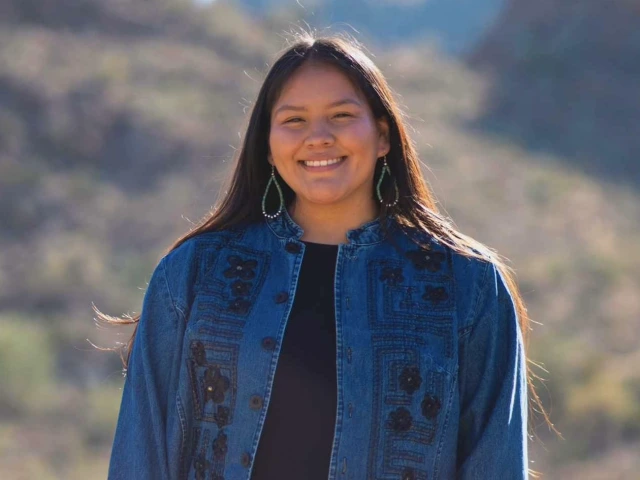
Tommey Jodie

Dani Kouyoumdjian

Lindsey Maillard

Camille Leihulu Slagle
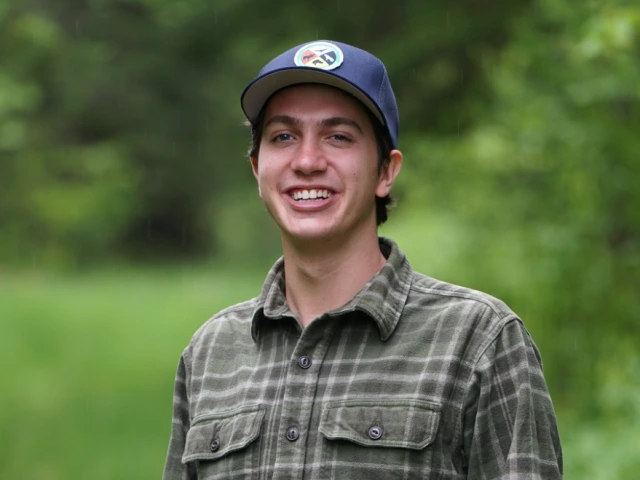
Avery Tilley
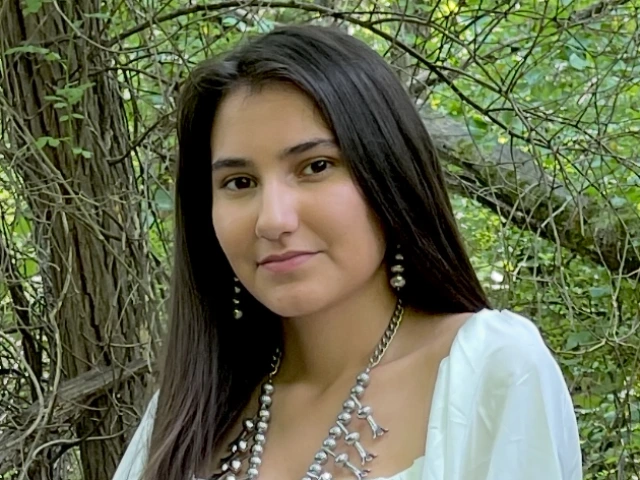
Tru West
Meet Previous Correspondents
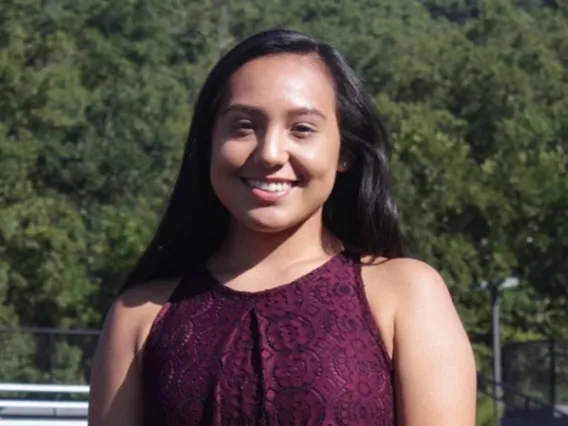
Raylen Bark
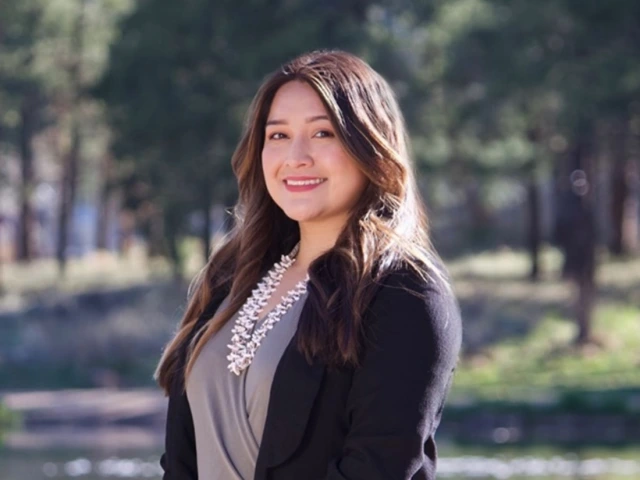
Darrien Benally

Kimberlee Blevins
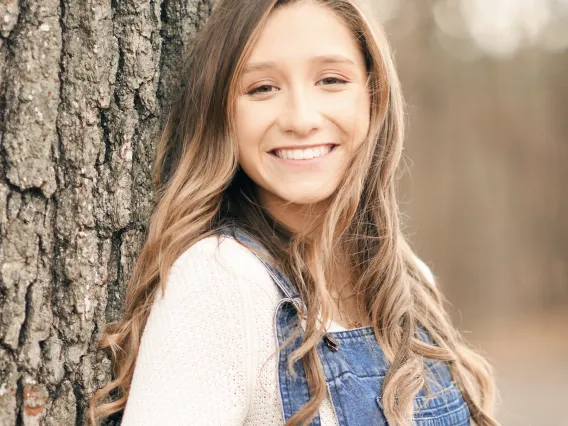
Abigail Burgess
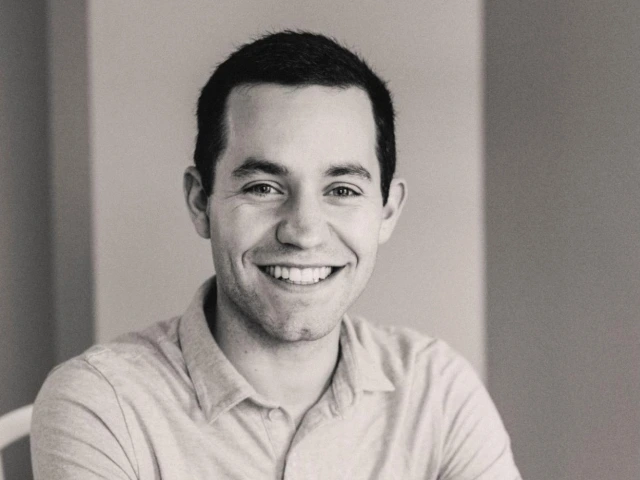
Alexander Cotnoir
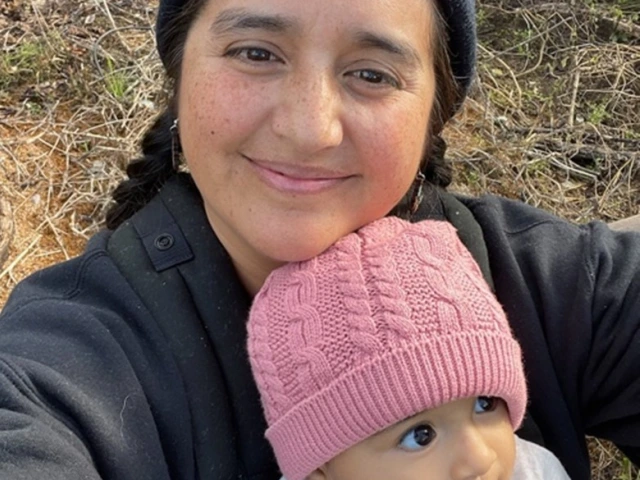
Carlie Domingues
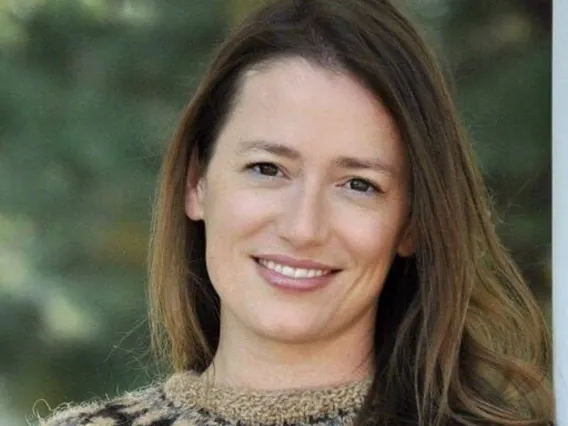
Mickki Garrity
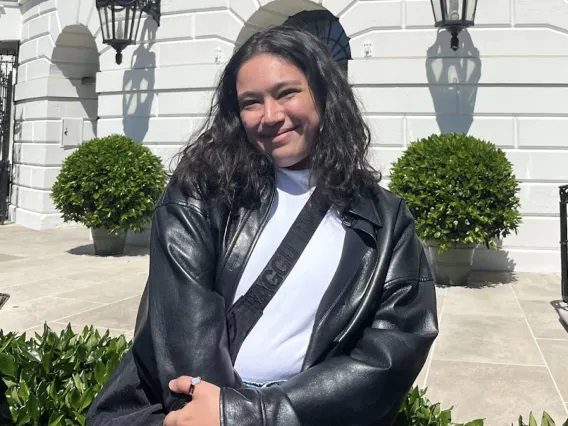
Alicia Glassman
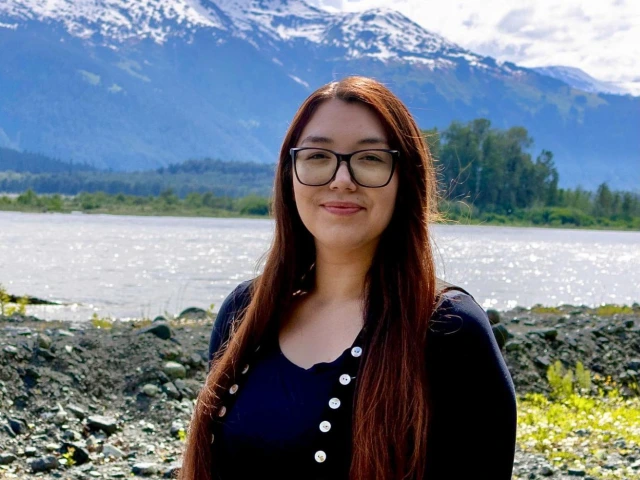
Shawna Hotch

Robyn Kay Iron
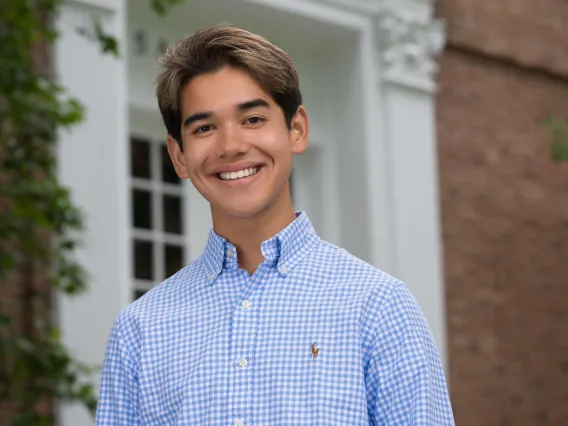
Chase Kamikawa
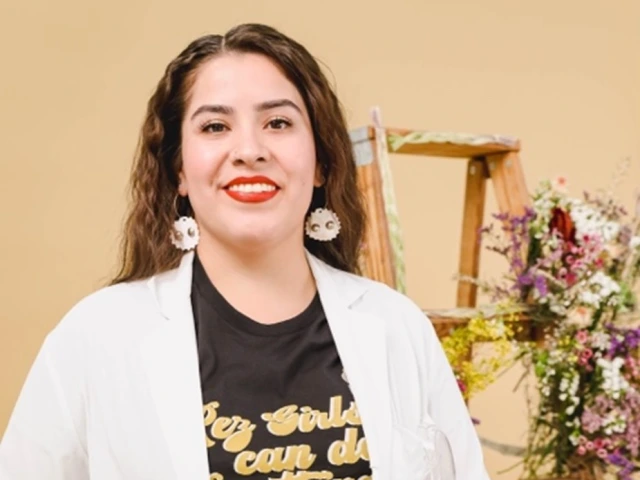
JoRee LaFrance
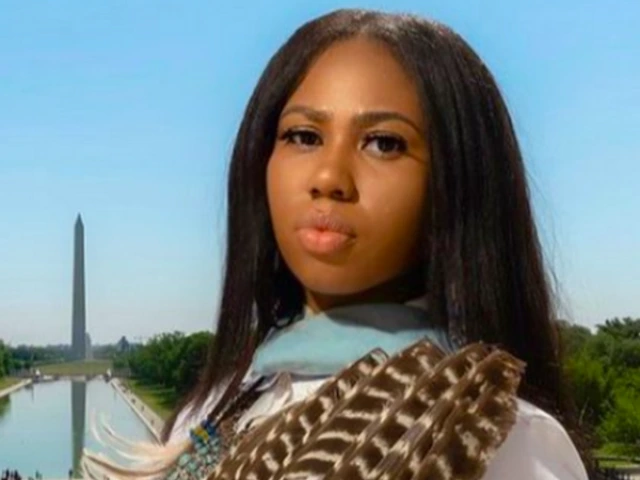
Troi Madison Newman
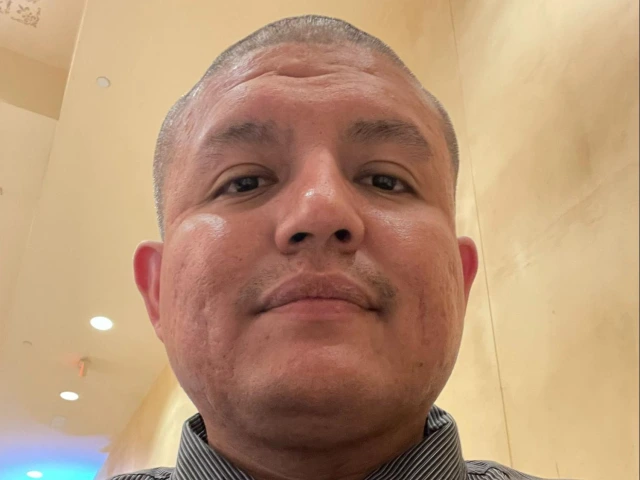
Joshua Massey
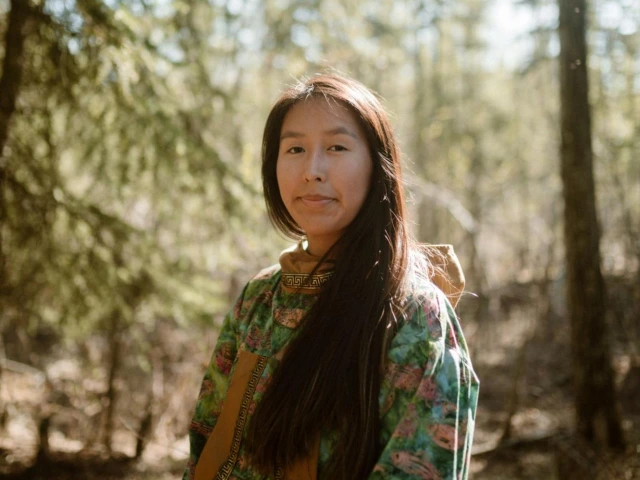
Shondiin Mayo
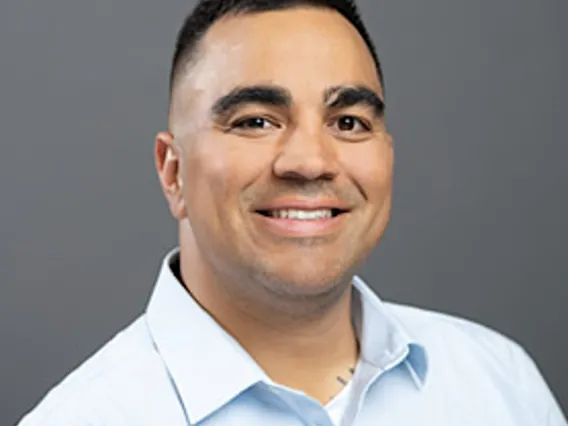
Emiliano McLane
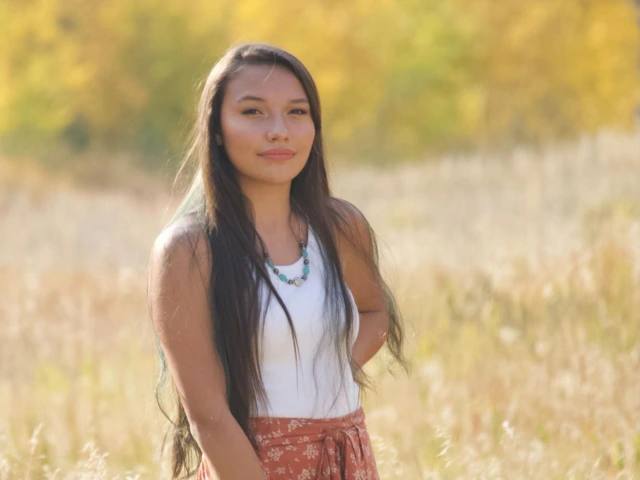
Taliyah Medicine Horse

Nadira Mitchell
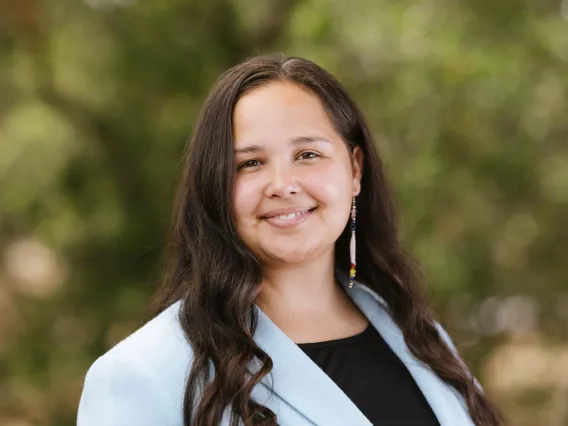
Karli Moore

S. Claire Neel
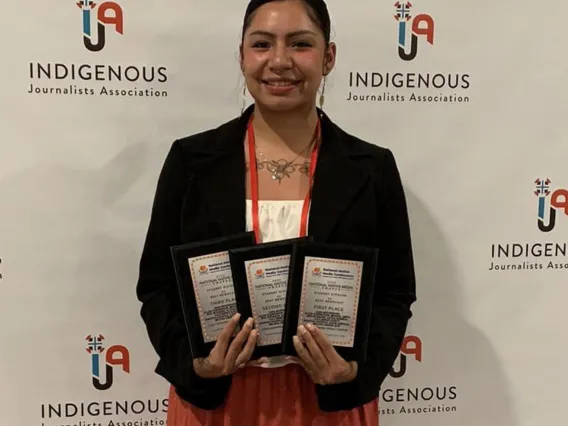
Alyssa Noriega
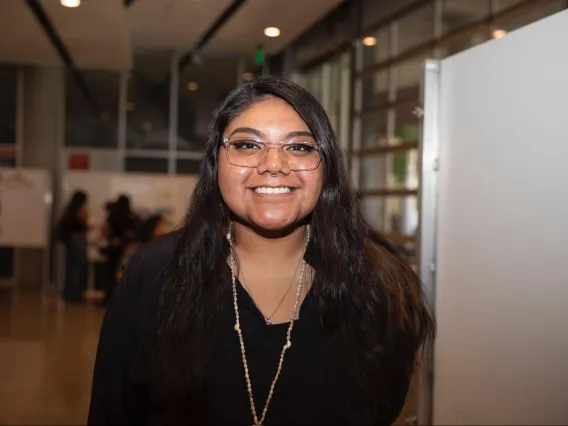
Trinity Norris
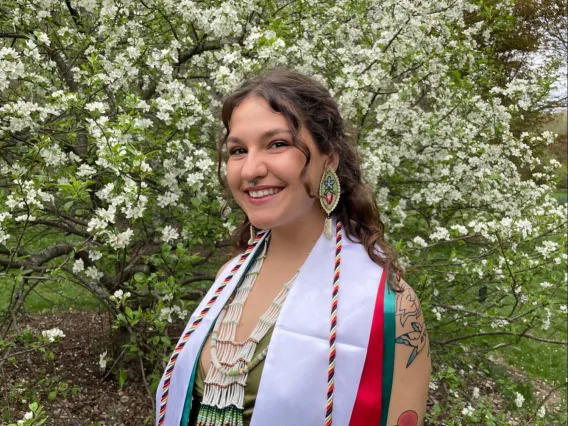
Sagen Lily Quale

Alisa Smith Woodruff

Angel Stickman
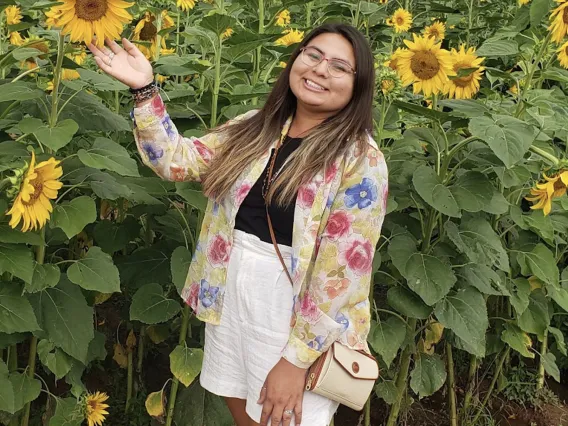
Nizhoni Tallas
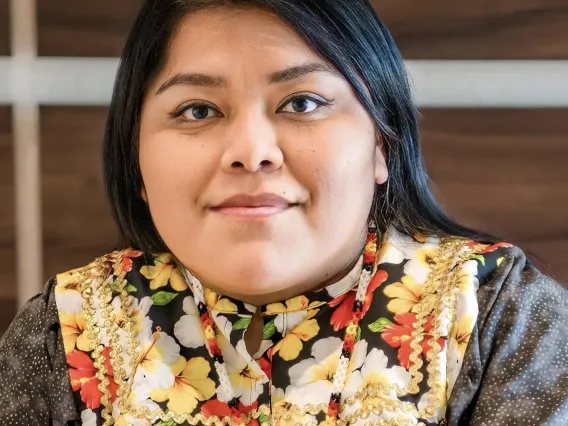
Shannon Taylor
